#'first existentialist philosopher'
Explore tagged Tumblr posts
Text

bad wolf soda <3
#level of obsession reached where i zoom in on screenshots to see what shes reading#p sure that says kierkegaard in white but thats as far as im getting#'first existentialist philosopher'#okay i really gotta find out what the fuck existentialism really means now bc carmilla seems to like it#'related to the meaning purpose and value of human existence.#Common concepts in existentialist thought include existential crisis dread#and anxiety in the face of an absurd world and free will as well as authenticity courage and virtue.'#SCREAM OKAY I SEE I SEE#kierkegaard beauvoir sartre nietzsche camus yep p sure those all get mentioned#okay this is fun#kierkegaard was like an existentialist before the word and hes from the first half of the 19th century#dont know if you can call vampires contemporaries of people bc....immortal. but carmilla was a contemporary of him#technically#and then when existentialism gets named halfway the 20th century carmilla has just escaped her blood coffin punishment#and so shes alone for a little bit without direction. perhaps free or perhaps waiting for mother to show up again#it's fun that existentialism seems sort of to be abt there being a choice abt who you want to be#that youre not defined by an essence. that What You Are is not defined pre what you do#so you can shape yourself#it's interesting the tension between that belief and the position carmilla is in. no wonder theres self-loathing#but also! she starts resisting the What She Is that is imposed on her. after 1945. starts sabotaging plans#i gotta go download some books#'ive got a talk i wanna catch on goethe' hang on im googling#1749-1832 she lived through that too#oh right faust and young werther i know of those#'Goethe admitted that he 'shot his hero to save himself' a reference to Goethe's near-suicidal obsession for a young woman a passion he que#relatable#god theres so much to read in the world and i have not read any of it#carmillaposting#i wonder what she'd write her dissertation about
5 notes
·
View notes
Text
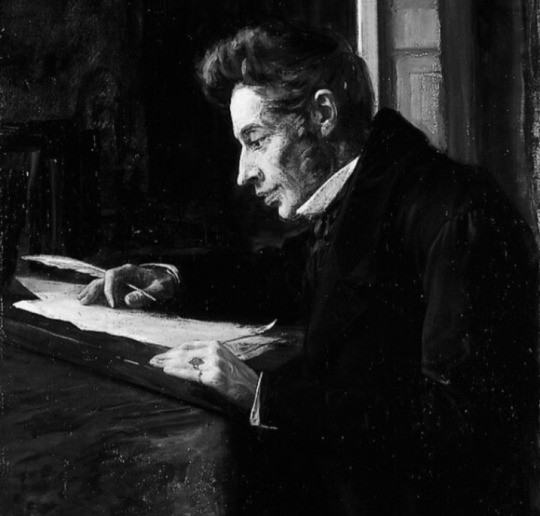
“People settle for a level of despair they can tolerate and call it happiness.”
— Søren Kierkegaard (5 May 1813 – 11 November 1855)
#Søren Kierkegaard#Denmark#theologian#philosopher#poet#social critic#religious author#first existentialist philosopher#Existentialism#quotes
13 notes
·
View notes
Note
Hello there, I just wanted to say how much I love your writing. I don’t use Tumblr that often, but I find myself checking in just to see your posts. The details are absolutely amazing!
I was wonder if you could write about the boys and how they’d be as parents with children who’s the opposite of their personalities.
Example: Yoongi who’s a introvert with a child that’s an extrovert. Taehyung who’s a extrovert with a child that’s an introvert etc etc
I’d really love to read your take on this.
Please and thank you. ❤️
💌 Reply:
hiii, lovely... first off THANK YOU so much for your kind words and for trusting me with this gem of a request! 💜 it’s readers like you who make my lil writing heart do backflips, even when my brain is mush ... i’ll be honest; the maknae line kicked my butt this time, especially taehyung... but i hope the headcanons are still what you wanted if anything feels a lil underbaked, please yell at me 💜 – c –🍪✨
BTS as Parents to Opposite-Personality Kids - Headcanons
↳ BTS!Dad's x Daughter/Son
Pairings: none (parent-child focus)
Rating: G (family fluff, mild angst)
Genre: family fluff, Angst to fluff/comfort, emotional growth,(domestic AU)
Warnings: minor angst (parent-child misunderstandings), brief mentions of social anxiety



NAMJOON - Philosopher-Dad
quiet rebellion & love that bridges worlds
CHILD DESCRIPTION
Name: Soo-Min (they/them) Age: 13 Personality:
storm of contradictions
genius-level intellect (inherited from Joon)
zero interest in academia
prefers skateboarding (instead of cycling)
graffiti kid
dismantling toasters to "see how they scream"
quietly defiant
allergic to attention
fiercely protective of their anonymity
wears a black hoodie like armor
scribbles existential haikus on their shoes
“I’m not a leader. I’m a… ghost with opinions.”
Secretly Like Namjoon
obsessively journals (but burns the pages)
writes poetry online
titled “How to Disappear in a World That Demands Fireworks.”
hates being compared to their father
then quotes Nietzsche when angry
LIFE & CONFLICT
Public vs. Private
at home:
Soo-Min builds elaborate Rube Goldberg machines that end with a middle finger popping up
Namjoon stares
equal parts impressed and horrified
“Is this… commentary on capitalism?”
Soo-Min shrugs
“It’s commentary on you.”
in public:
refuses to attend BTS events
when forced, wears a mask (+ noise cancelling headphones)
glares at fans’ cameras
trends as “RM’s Emo Shadow”
Joon’s Google search history: “How to parent a tiny anarchist.”
Namjoon’s Concerns
“What if I’ve suffocated them with expectations?” “What if they’re too much like me terrified of being seen?”
buys parenting books titled “Raising Rebels” and “Teenage Existentialists.”
highlights passages with trembling hand at night
"THE SNAP"
Incident
Soo-Min spray-paints “F*CK YOUR LEGACY” on HYBE’s back wall
security catches them
Namjoon arrives, tie askew
their hood is down for the first time in years
their face splattered with paint and tears
Argument
Soo-Min: “You lecture about authenticity, but you’re just a brand. A mascot.” Namjoon: “You think I don’t hate it too? The speeches, the smiles? I do this so you can scream!” Soo-Min: “I don’t want your sacrifice! I want a dad!”
"BRIDGE"
Retreat
Namjoon cancels shoots
takes Soo-Min to a secluded temple in Jeju
no phones, no fans
they don’t speak for days
Breaking Point
Soo-Min finds Namjoon’s old journal in the temple
pages filled with 19-year-old Joon’s fears
“I’m a fraud. A leader who can’t lead himself.”
Conversation
Soo-Min: “You… felt like this too?” Namjoon: “Every day. Still do.” Soo-Min: “Then why do you pretend?” Namjoon: “I don’t. I just… choose what to fight for. Like you.”
AFTERMATH
Compromise
Namjoon helps them graffiti HYBE’s approved “activism wall”
their tag: “REBEL WITHOUT A CAUSE (BUT WITH A DAD).”
Soo-Min agrees to one public appearance (monthly)
= RM’s indie poetry reading (on Weverse)
they sit in the back
hood up
but comments from time to time
Growth
Namjoon
releases a solo track sampling Soo-Min’s machine noises
lyrics: “My greatest creation isn’t art; it’s us.”
Soo-Min
posts their poetry under a pseudonym
Namjoon anonymously comments:
“This writer gets it. Proud of you. – A Fan.”



JIN - Glamorous Goofball
quiet contradictions & love that dances to a different beat
CHILD DESCRIPTION
Name: Ji-Yoo (she/they) Age: 10 Personality
storm cloud in a sequined jacket
shy
fiercely independent
allergic to glitter
wears band tees under jeans/leather jackets
scribbles angsty song lyrics on their converse
spends hours dissecting rock albums in their noise-canceling headphones
“I’m not cute. I’m… complicated.”
secretly plays guitar in their closet
composing rage-fueled ballads about cafeteria tuna sandwiches
Secretly Like Jin
inherited his stubbornness
refuses to admit they love his kimchi fried rice
uses sarcasm as a shield
laughs at his dad jokes when no one’s looking
has his cheekbones
hides them under a curtain of black hair
LIFE & CONFLICT
Clash of Worlds
at home
Jin hosts “Family Talent Shows” where he performs Super Tuna 2.0 in a shark costume (younger siblings love it)
Ji-Yoo hides under the couch
“This is emotional terrorism.”
in public
Jin tries to hype them at school events
“Ji-Yoo’s the next BIGBANG! Right, kiddo?”
they fake a stomachache
Jin finds their crumpled note:
“Stop embarrassing me.”
Jin’s Concerns
“What if she thinks I don���t see her?” “Why won’t she let me in?”
buys a book called “Parenting Your Tiny Rebel”
doodles sad faces in the margins
"THE SNAP"
Incident
Ji-Yoo’s school talent show
Jin surprises them with a “Father-Daughter Rock Duet”
complete with light-up guitars)
they freeze
mortified
they bolt offstage
later they scream at him
“I’m NOT your accessory! I hate your stupid songs!”
Argument
Jin: “I just wanted to share the spotlight!” Ji-Yoo: “Your spotlight burns! I’m not you!” Jin: “But… I’m proud of you!” Ji-Yoo: “You’re proud of yourself for having a kid!”
"BRIDGE"
Retreat
cancels a variety show appearance
takes Ji-Yoo camping
no cameras
no costumes
they don’t speak for two days
just eat burnt marshmallows and listen to crickets
Breaking Point
Jin finds Ji-Yoo’s hidden playlist: “Songs My Dad Would Hate (maybe)”
featuring BTS’ Ddaeng and Nirvana
he listens
awkwardly air-guitars to Smells Like Teen Spirit
Conversation
Jin: “I… like this? It’s… loud. But good loud?” Ji-Yoo: “You’re terrible at headbanging.” Jin: “Teach me?”
AFTERMATH
Compromise
Jin learns her favourite songs
writes a punk version of Super Tuna
Ji-Yoo records it
posts it anonymously
“Worldwide Handsome’s Midlife Crisis (Pls Send Help).”
Ji-Yoo agrees to one dad joke per day
Jin uses it wisely
“Why did the rockstar cross the road? To avoid his dad!”
they groan
but they smile
Growth
Jin
releases a SoundCloud collab with them
“Tuna Meltdown (feat. Angry Ghost)”
lyrics: “I’m not your shadow / I’m your mirror.”
Ji-Yoo
wears a “WWH” pin upside down on their backpack
“Irony...”
Jin knows better



YOONGI - Reluctant Softie
loud legacy & love composed in minor keys extrovert prodigy & love that drowns out doubt
CHILD DESCRIPTION:
Name: Yumi (she/her) | nickname: "Bam" (after her chaotic energy) Age: 15 Personality:
neon hurricane in human form
ADHD-fueled
loud!
thrives in crowds
dreams of being a K-pop idol (tho does she really?)
despite Yoongi’s quiet disdain for the industry’s glitter
wears sequined jackets and rainbow hair clips
“to blind the haters”
posts dance covers online with captions like “Suga Who? I’m the Main Character.”
Secretly Like Yoongi
practices choreography until her feet bleed (hates making mistakes)
hides it under sparkly bandaids
writes angsty lyrics in a password-locked Notes app
“They see the glitter, not the glue.”
craves validation but calls it “cringe”
snaps at fans who say: “You’re just like your dad!”
LIFE & CONFLICT
Home vs. Stage
at home:
blasts TWICE at 3 a.m.
drags friends into Yoongi’s studio for “dance emergencies”
Yoongi grumbles
“This is a workplace, not a daycare"
tho leaves snacks out “for the raccoons”
in public:
calls herself “Bam-ssi”
avoiding the “Min Yoongi’s Daughter” tag
posts TikTok rants
“I’m not a legacy act. I’m a revolution.”
trends for clapping back at a troll
“My dad’s a producer, not a prophet. Fight me.”
Yoongi’s Concerns
“She’s too young to know how this industry eats souls.” “What if she thinks I’m ashamed of her?”
buys noise-canceling headphones and concert earplugs “for her safety”
secretly bookmarks her videos
"THE SNAP"
Incident
Yumi auditions for a TV show without telling him
her clip goes viral
“Why should I care about nepotism? My dad’s old news.”
Yoongi watches it on loop
his jaw clenched
Argument
Yumi: “You’re just scared I’ll beat your records!” Yoongi: “You think I give a shit about records? I care about you getting chewed up and spit out!” Yumi: “You don’t get it! I need to be seen!” Yoongi: “I see you. Why isn’t that enough?!”
"BRIDGE"
Retreat
Yoongi cancels a production deadline
takes Yumi to his childhood home in Daegu
no Wi-Fi
no mirrors
just the piano he learned on
Breaking Point
Yumi finds his old notebooks
lyrics scribbled with “I’m not enough” and “Who am I without music?”
she plays his first mixtape on her phone
“You were… scared too?”
Conversation
Yoongi: “I still am. Every damn day.” Yumi: “Then why’d you let me hate you?” Yoongi: “Better me than the world.”
AFTERMATH
Compromise
Yoongi produces her debut single “Glitter Blood” under a pseudonym
lyrics: “I’m my father’s shadow / and the sun that burns it off.”
Yumi agrees to keep her stage name “Bam”
adds “Prod. SUGA” in tiny font
“For the clout...”
she smirks
he rolls his eyes
“Respect your elders.”
Growth
Yoongi
wears a sequined keychain she made
“It’s… reflective. For safety.”
Yumi
lets him attend her first concert
he stands in the back
hood up, crying into his coffee
“She’s… good.”



J-HOPE - Sunshine Cheerleader
silent storm & love that finds rhythm in chaos
CHILD DESCRIPTION
Name: Min-Jae (he/him) Age: 12 Personality:
stoic
grounded force of nature
introverted, observant
allergic to attention
prefers the crisp snap of a taekwondo belt to any pop beat
spends weekends covered in mud on a rugby field
dresses in monotone sweatshirts and tactical boots
rolling his eyes at Hobi’s wardrobe
secretly steals his hoodies when no one’s looking
“Fashion’s pointless. But… his sweater is soft.”
Secretly Like Hobi
organizes his rugby gear with military precision
inherited Hobi’s obsession with order in his wardrobe at home
hum’s “Dynamite” while studying
denies it
“The walls are thin, Appa. Not my fault.”
keeps a hidden sketchbook of jersey designs (neon accents, hidden rainbows)
LIFE & CONFLICT
Clash of Worlds
at home:
Hobi tries to teach Min-Jae “just one dance move!” during laundry-folding
Min-Jae deadpans
“I’d rather eat broccoli.”
Hobi retaliates by blasting “Boy With Luv” while vacuuming
in public:
Min-Jae ducks behind Hobi at red carpets
scowling at cameras
trends as “J-Hope’s Shadow.”
Hobi’s search history: “How to parent a tiny soldier.”
Hobi’s Concerns
“Did I… smother him with too much joy?” “What if he thinks I’m embarrassed of him?”
buys parenting books titled “Quiet Kids, Loud Love” and “Raising Rebels Without Rainbows.”
dog-ears pages on “validation without pressure”
"THE SNAP"
Incident
Hobi surprises Min-Jae with a speech to him during“Hope on Stage.”
Min-Jae storms out mid-show
texts: “Stop trying to make me you.”
Hobi finds him hours later
punching a rugby tackle bag until his knuckles bleed
Argument
Min-Jae: “You’re embarrassing. Always smiling, always on. I’m not your backup dancer!” Hobi: “I just want you to feel what I feel... alive!” Min-Jae: “I am alive! Just… not your way!”
"BRIDGE"
Retreat
Hobi cancels a photoshoot
takes Min-Jae camping
no music
no mirrors
just a tent and a first-aid kit (Min-Jae’s request)
they don’t speak but hate it too much after a few hours
Breaking Point
Hobi finds Min-Jae’s sketchbook
pages of rugby jerseys with hidden Hope Wolrd flair
inclusing neon stitching (“Hope” in morse code)
Conversation
Hobi:“You… like my stuff?” Min-Jae:“It’s functional. The neon helps visibility.”
a lie
they both know it
Hobi: “Can I… design your next jersey?” Min-Jae: “Only if it’s subtle.”
AFTERMATH
Compromise
Hobi learns rugby rules
cheers from the sidelines in a custom jersey
black with glow-in-the-dark constellations
Min-Jae scores a try
he nods at him
= their version of a hug
Min-Jae agrees to one dance practice with BTS
Hobi teaches him to “two-step like you’re tackling a beat”
it’s awkward
they all cringe but laigh
Hobi keeps the video
Growth
Hobi
releases a merch line for “Quiet Warriors”
hoodies with hidden symbols/sequins...
Min-Jae wears his daily - “For visibility”
Min-Jae
leaves a sticky note on Hobi’s mirror
“You’re annoying. But… your smile’s kinda cool.”



JIMIN - Affectionate Nurturer
reserved rebel & love that finds its own language
CHILD DESCRIPTION:
Name: Ji-Eun (she/her) Age: 11 Personality:
stoic
analytical introvert
prefers logic over emotion
she’s a chess prodigy who solves advanced math puzzles for fun
keeps a “Feelings Spreadsheet” to track her moods
spoiler: 87% labeled “neutral”
dislikes physical touch, crowds, and “unnecessary noise"
wears noise-canceling headphones everywhere
answers questions in monosyllables
secretly writes dry, sarcastic fanfiction about historical figures
Secretly Like Jimin
performs random acts of kindness
=fixing a classmate’s broken pencil case
claims it’s “just efficiency”
whispers song lyrics under her breath when stressed
“Promise” is her go-to
hates attention
tho blushes when Jimin calls her “my genius”
LIFE & CONFLICT
Clash of Love Languages
Jimin’s Approach:
morning hugs
surprise gifts (sparkly stationery, plushies)
daily “How Do You Feel?” check-ins.
Ji-Eun’s Reaction:
shrugs off hugs
donates plushies to charity
answers check-ins with: “Functioning at 73% capacity.”
Jimin’s Concerns
“Does she even like me?”
texts Taehyung at 2 a.m.: “What if I’m too much?”
buys a parenting book titled “Raising Robots?”
highlights the chapter “Emotional Encryption”
panics when she requests a “logical birthday”
= no cake, no singing
just a spreadsheet of gift options
Public vs. Private
at BTS family events, Ji-Eun hides in closets
avoiding "Jimin’s affectionate friends"
“Uncle Tae tried to high-five me. Why.”
Jimin laughs nervously
“He’s… practicing.”
"THE SNAP"
Incident
Jimin surprises Ji-Eun with a front-row ticket to her favourite artists concert
imagining a heartwarming father-daughter moment
she spends the entire show in the bathroom
calculating Pi to calm her anxiety
Argument
Jimin: “I just wanted you to see… how much I love you, our time...” Ji-Eun: “You love attention. I don’t. Stop forcing me to be like you.” Jimin: “I’m not...! I just… want to share my world with you.” Ji-Eun: “Your world is loud.”
"BRIDGE"
Catalyst
Ji-Eun’s homeroom teacher emails Jimin after noticing her "unique learning style"
= her chess mastery, aversion to group activities, meticulous spreadsheets tracking classroom noise levels...
suggests an evaluation
framing it gently
“She’s brilliant, but I think she experiences the world differently. This might help her thrive.”
Jimin’s Reaction
panics
calls Namjoon
“Did I miss something? Is she… unhappy?”
researches autism until 4 a.m.
scribbling notes
“Sensory overload… routines… literal thinking.”
realizes her headphones, spreadsheets, and “tolerable hugs” weren’t defiance
= they were survival tools
books an appointment with a neurodiversity-affirming psychologist
hands trembling as he fills out forms
Diagnosis Journey
Ji-Eun’s Assessment:
dismantles the psychologist’s Rubik’s Cube in 30 seconds
“Patterns are easy. People aren’t.”
psychologist smiles
“You’re right. Let’s talk about your patterns.”
Jimin’s Guilt:
overheard in the waiting room
“What if I pushed her to be ‘normal’? What if she thinks I’m disappointed?”
Conversation
Ji-Eun processes the diagnosis like a puzzle solved
Ji-Eun: “So my brain has a different operating system. That explains the… glitches.” Jimin: “You’re not glitched, baby. The world just… buffers sometimes.” Ji-Eun: “Can we upgrade the software? Like, mute unnecessary sounds?” Jimin: “We’ll write the code together.”
AFTERMATH
Understanding & Adaptations
Sensory Safe Space
Jimin soundproofs her bedroom
fills it with weighted blankets and dimmable LED stars
Ji-Eun labels it “Efficiency Zone 1.0.”
Communication Tools
they create a color-coded system
Red Light: “No touch, no talk.”
Yellow Light: “I can listen, but my eyes need a break.”
Green Light: “You have 3.5 minutes to discuss feelings.”
Jimin’s Growth
learins to replace “Why won’t you hug me?” with “How can I help?”
texts the group chat
“Turns out, love isn’t loud. It’s… listening.”
Yoongi replies: “Took you long enough...”
Ji-Eun’s Growth
writes a school presentation: “Autism: A User Manual.”
includes a slide titled “Why My Dad Cries a Lot (But It’s Okay).”
lets Jimin teach her a dance move - once
“Your form is 62% adequate.”
he sobs into her hair



TAEHYUNG - Whimsical Artist
silent observer & love painted in shadows and light
CHILD DESCRIPTION
Name: Ji-Hoon (he/him) Age: 10 Personality:
quiet
observant boy who shrinks from crowds
hides under oversized sweaters
hates cameras, loud noises, especially flashlights
harsh beams make him feel "like a bug under glass"
prefers sketching in the margins of notebooks to speaking
capturing the world in delicate pencil strokes
secretly adores astronomy
refuses to visit planetariums
“Too many people staring at the sky instead of their feet”
Secretly Like Taehyung
inherits his dad’s eye for beauty
expresses it in whispers
= pressed flowers in textbooks, origami stars hidden in drawers
creates intricate charcoal portraits of strangers
then tears them up (fearing attention)
humms Tae’s songs under his breath when he thinks no one’s listening
LIFE & CONFLICT
Public vs. Private
at home:
Tae fills the house with art supplies, jazz records, impromptu photo shoots...
Ji-Hoon retreats to his “fort”
= a blanket-covered desk with fairy lights
Tae pokes his head in daily
“Let’s paint the walls rainbow!”
Ji-Hoon grimaces
“...Pass.”
in public:
Tae’s Instagram is a lately a kaleidoscope of fashion and fans
Ji-Hoon wears noise-canceling headphones and a hat pulled low
trends once as “V’s Mystery Shadow” after photographs snap him glaring at a flashlight
Tae’s caption: “My little eclipse 🌑✨”
Taehyung’s Concerns
“Am I smothering him? Or not seeing him enough?”
buys every “introvert parenting” book
scribbles notes like “Quiet ≠ Broken” in the margins
tries bonding through art
Ji-Hoon’s sketches stay locked in a tin box labeled “DO NOT OPEN.”
"THE SNAP"
Incident
Tae surprises Ji-Hoon with a “father-son gallery showcase”
showcasing his secret sketches
room floods with flashlights and fans
Ji-Hoon freezes
he bolts, knocking over a display of his own art
Argument
Ji-Hoon: “You ruined it! My art is mine... not your content!” Tae: “I just wanted the world to see how amazing you are!” Ji-Hoon: “I don’t want the world! I just want you!”
"BRIDGE"
Retreat
Tae cancels all schedules
takes Ji-Hoon to a secluded cabin in the woods
no electricity
no cameras
just the Milky Way sprawling overhead and a telescope
Breaking Point
Ji-Hoon finds Tae’s old sketchbook in the cabin
pages of younger Tae’s anxieties
“What if they only love the idea of me?”
Conversation
Ji-Hoon: “You… felt invisible too?” Tae: “Every day. Still do, sometimes.” Ji-Hoon: “Then why do you shine so much?” Tae: “Because shadows need light to exist. Like us.”
AFTERMATH
Compromise
Tae builds Ji-Hoon a private studio in the attic
no flashlights, no visitors
Ji-Hoon hangs a sign: “Appa Allowed (Sometimes)”
Ji-Hoon lets Tae display one piece
= a charcoal sketch of their cabin under the stars
Tae’s caption: “Our Universe 🌌 (Shared with permission)”
Growth
Taehyung
starts a midnight astronomy ritual with Ji-Hoon
pointing out constellations with a laser pen
“See that one? Looks like your sneaker.”
Ji-Hoon snorts
“That’s Orion, Appa.”
Ji-Hoon
gives Tae a folded origami star with a note
“You’re my favorite galaxy.”
Tae wears it as a necklace until it falls off



JUNGKOOK - Golden Retriever Dad
quiet contemplation & love that finds common ground
CHILD DESCRIPTION
Name: Min-Jun (he/him) Age: 10 Personality
thoughtful
introverted bookworm
prefers the quiet corners of libraries to soccer fields
deeply sensitive
a knack for poetry, fear of crowds
carries a sketchbook everywhere
filling it with delicate drawings of clouds, insects, imaginary worlds...
Min-Jun shrinks from Jungkooks spotlight
finding solace in solitude
“Why run when you can sit and wonder?”
mutters when his dad suggests a going out
Secretly Like Jungkook
inherits his dad’s stubborn determination
channels it into mastering origami or memorizing constellations
has a hidden competitive streak
beats Jungkook at chess every time but never gloats
loves music but prefers composing haunting piano melodies over pop anthems
LIFE & CONFLICT
Clash of Worlds
at home
Jungkook’s gym is littered with Min-Jun’s origami cranes and half-finished puzzles
“Appa, your dumbbells are crushing my art!”
sighs, rescuing paper dragons
Jungkook responds by doing bicep curls with the dragon on top
“See? Functional art!”
in public
Jungkook’s attempts to share his world end in disaster
= like bringing Min-Jun on stage during a concert encore
Min-Jun freezes under the lights
dropping his sketchbook
fans coo over “JK’s shy angel”
Min-Jun cries himself to sleep
“I’m not a prop”
writes in his journal
Jungkook’s Concerns
“What if I’m failing him? What if he thinks I’m embarrassed he’s not… like me?”
buys parenting guides like “Raising Sensitive Souls” and “Quiet Kids, Loud Hearts”
dog-earing pages about “validation”
secretly envious of Taehyung’s artsy bond with his own kid
“Hyung, how do you… talk about feelings?”
"THE SNAP"
Incident
Jungkook signs Min-Jun up for a father-son boxing class
hoping to “build confidence”
Min-Jun spends the session crouched in a corner
sketching the other kids’ shoes
when Jungkook jokingly calls him “my little turtle” Min-Jun snaps
Argument
Min-Jun: “Stop trying to fix me! I’m not broken!” Jungkook: “I just want you to be strong!” Min-Jun: “I am strong! You just don’t see it!”
"BRIDGE"
Retreat
Jungkook cancels a photoshoot
takes Min-Jun camping in the mountains
no cameras
no crowds
they don’t speak for the first night
Breaking Point
Jungkook finds Min-Jun’s sketchbook open to a page titled “Things I Wish Appa Knew”
drawings include a tearful boy trapped in a shadow labeled “EXPECTATIONS”
giant hand (Jungkook’s tattoos visible) gently holding a origami heart
Conversation
Jungkook: “You… think I don’t see you?” Min-Jun: “You see your version of me.” Jungkook: “Show me yours. Please.”
AFTERMATH
Compromise
Jungkook converts a corner of his studio into Min-Jun’s “Art Cave”
stocked with watercolors, “No Dumbbells Allowed” sign...
Min-Jun agrees to play piano with Jungkook
Jungkook’s first composition?
= clumsy but heartfelt tune titled “Min-Jun’s Clouds”
Growth
Jungkook
late-night Live rambling about “invisible strengths”
fans spot Min-Jun’s origami dragons/cranes on his shelf
“My kid’s the real superhero”
murmurs grinning
Min-Jun
secretly submits a poem to a contest
wins
title: “My Dad, the Quiet Warrior.”
Jungkook frames it next to his awards
#magicshopstories#bts fanfic#bts#bts imagines#bangtan fanfic#bts army#bts suga#bts au#bts namjoon#sugaheadcanons#yoongiheadcanons#suga imagines#suga scenarios#yoongi imagine#yoongi scenarios#jin imagines#jinheadcanons#jin scenarios#jin bts#namjoonheadcanons#namjoon imagine#jhope imagines#jhope fanfic#jimin scenarios#jiminheadcanons#jimin imagine#taehyung headcanons#taehyung imagine#jungkook imagine#jungkook headcanons
57 notes
·
View notes
Note
Hey! Do you still help with translations for tattoos? Any help would be amazing and greatly appreciated!
I’d love the following from Dune, but in Moria Script!
‘Not a problem to solve, but a reality to experience’
Well met, mcnewguy!
Yes — I do still assist with Neo-Khuzdul translations, especially when the request carries personal meaning or creative intent. While many reach out for tattoos, my work often tends to go beyond direct inscription — aiming to consider linguistic accuracy, cultural and historical context, and tone, with as much care and depth as the phrase deserves.
You asked for a Neo-Khuzdul translation of:
“Not a problem to solve, but a reality to experience.”
It’s a powerful line. Worth noting, however, that the original quote from Frank Herbert’s Dune is actually:
“The mystery of life isn't a problem to solve, but a reality to experience.”
This line is itself closely inspired by the 19th-century philosopher Søren Kierkegaard, who wrote:
“Life is not a problem to be solved, but a reality to be experienced.”
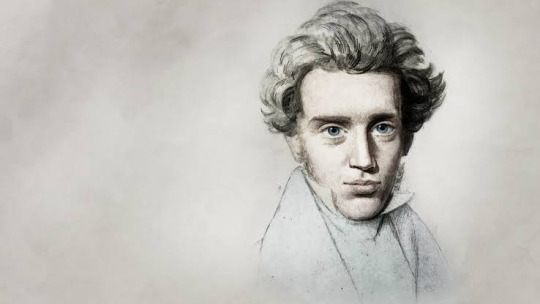
Sketch of Søren Kierkegaard
🌌 Kierkegaard, Existentialism, and Tolkien
Though Kierkegaard lived nearly a century before existentialism became widely known, he’s often regarded as its first thinker. His Christian existentialist philosophy emphasized personal choice, the confrontation with despair, and the pursuit of meaning through lived experience — ideas Herbert clearly drew from in Dune.
While Tolkien never explicitly references Kierkegaard (to my knowledge), it’s likely he was at least familiar with his works, particularly through Charles Williams (fellow Inkling and editor at Oxford University Press), who personally championed the English translation and publication of Kierkegaard’s writings.
Tolkien’s world, too, reflects deeply existential themes — especially in how Elves and Men grapple with mortality and fate. Wraiths, for example, can be seen as literalizations of Kierkegaard’s concept of “living death”: caught between life and death, devoid of purpose, driven by fear and despair. As in Kierkegaard’s view, despair in Tolkien is not just an emotion — it’s a spiritual condition.
In this way, your quote rests at a meaningful crossroad between Dune, Kierkegaard, and Middle-earth.
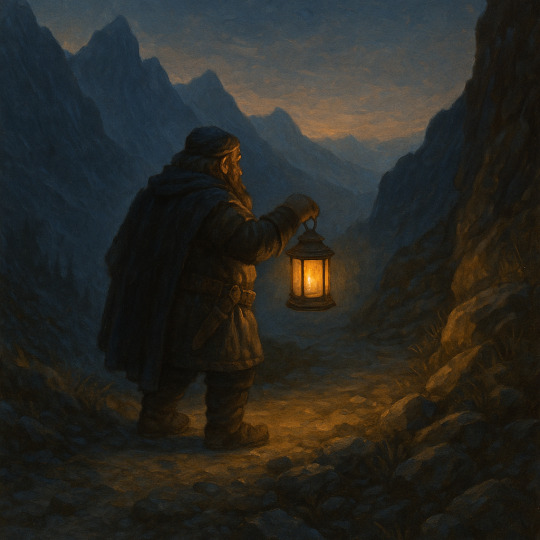
Clarity amid Uncertainty
🧭 A Note on Tolkien and Dune
It’s also worth mentioning that while your chosen quote bridges existential philosophy and fantasy, J.R.R. Tolkien himself held a notably negative opinion of Dune. In a letter to John Bush dated March 12, 1966 (entry 964 in Tolkien’s Library), he wrote:
“I dislike Dune with some intensity… in that unfortunate case it is much the best and fairest to another author to keep silent and refuse to comment.”
Tolkien never elaborated on the reasons for this strong dislike. However, some have suggested that it stems from the stark philosophical contrast between the two authors: Tolkien, a devout Catholic and staunch deontologist, emphasized virtue, duty, and moral absolutes — whereas Herbert’s Dune leans heavily into consequentialism, where actions are judged by their outcomes. These opposing ethical frameworks shape the very core of their respective mythologies.
Still, the fact that a line originating from Kierkegaard could echo through both Herbert’s Dune and now a Dwarvish rendering is a testament to the lasting power of good philosophy — and the universality of certain truths, across all worlds.
🪓 Neo-Khuzdul Translation
Lu banal du bâbnul, ak aksât d' arfur. (Not a problem to solve, but a reality to experience.)
Let’s briefly unpack it:
lu — “not”
banal — “problem” (from the root BNL)
du — “to”
bâbnul — “to solve” (also form the root BNL - from tabnili, “to face problems” + allied prefix ba- to indicate removal/overcoming)
ak — “but” or “yet”
aksât — “reality”
d' — shortened form of du, used for smoother flow before vowels
arfur — “(to) experience” (infinitive)

The phrasing is carefully constructed with a tone fitting of Durin’s folk. I hope it serves you well — whether carved in stone, etched in ink, or simply carried forward in thought.
Ever at your service, The Dwarrow Scholar
37 notes
·
View notes
Note
Hello, good afternoon. How are you? I would like to say that I find your analyses extremely cohesive and that you are one of the few I have seen so far who can analyze the work of Jujutsu Kaisen beyond the surface. The question I would like to ask is, what does death represent for JJK? What is its function within the manga and also what is the function of the way it is treated in the work through the fatalities that occur in the plot and with its characters? I haven't read all of your analyses, so forgive me if you have already talked about this subject before. If you see it, I appreciate your attention, and if you can't answer, I apologize for the inconvenience.
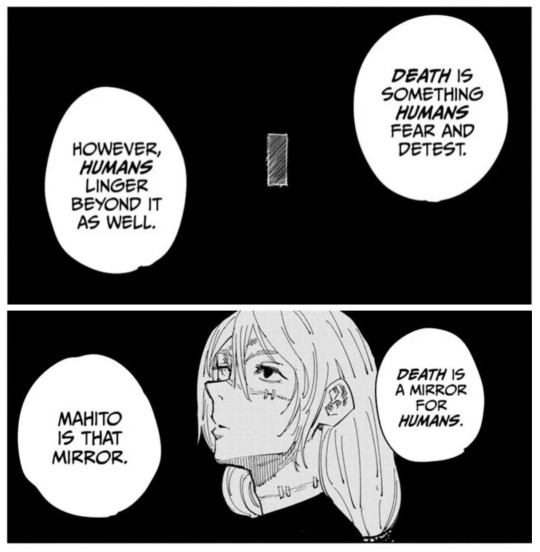
So I think at it's core Jujutsu Kaisen is a very existentialist manga. The central question that the literal main character is trying to answer himself is how can life possibly have meaning, if it always ends in death? For the first half of the manga, the fight between the main character and his villainous foil have completely opposite answers to that question. Yuji is continually searching for meaning in death, because it HAS to mean something otherwise how does life have meaning if it always ends in death? Whereas, Mahito believes that because life always ends in death it has no meaning.
I don't think one is necessarily right over the other, it's just conflicting philosophies. Yuji believes life has to have inherit meaning, and Mahito believes life has no inherent meaning. More under the cut.
Death is a Mirror
So, I believe the entire concept of Death in Jujutsu Kaisen can just be summarized as the panel I posted above. Of course I'm going to elaborate on that, but basically Death is a mirror. Humans try to find meaning out of the short life they have, because life always ends in death.
The philosopher Camus was quoted as saying once:
“There is only one really serious philosophical problem,” Camus says, “and that is suicide. Deciding whether or not life is worth living is to answer the fundamental question in philosophy. All other questions follow from that” (MS, 3).
All philosophy is therefore, an attempt to justify whether or not life is worth living. Why are we alive? As I said above, Yuji cannot accept that life always ends in death so he tries to search for meaning in death. His grandfather's curse (telling him to save people so he can die surrounded by people) and his concept of a "meaningful" death for the first half of the manga is Yuji debating with this philosophical concept.
Yuji is introduced to the danger of the world when he is thrown into the world of sorcery. Much like Geto, he has heroic notions of being a sorcerer which are challenged when he realizes both how easily people can die, but how easily his fellow sorcerers can die as well.
This is the philosophical question that essentially broke Geto's brain. What is the meaning of young sorcerers like himself fighting and dying for an uncaring public, especially since the cycle will never be broken and sorcerers are basically sentenced to a life of continually exercising curses until they meet an early death. Then the next generation of sorcerers just continue the vicious cycle.
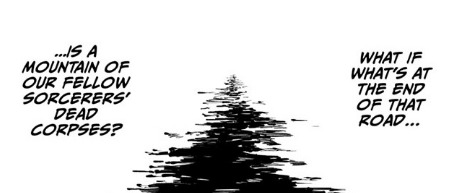
For Geto, death ends up negating all meaning to life. When he realizes that there's basically no meaning to the lives of sorcerers who constantly throw their lives away, he becomes completely unable to enjoy life. He accepts death at the hands of Gojo, because he couldn't continue living in the world, couldn't smile in the world with the way it was.
In some ways, Geto and Yuuta were the same. Geto was too sincere. To someone like him, the reality that the world of sorcerers presented to him was just too cruel. '...that in a world like this, I couldn't be truly happy from the bottom of my heart.' To live for the purpose of being yourself. And for that goal, Geto could only continue to pursue his twisted dream, drowning himself in the curse that lies in the gap between ideal and reality.\ This was the final confession of a man who could only choose to warp himself, who had erased himself in pursuit of his goals. The only person who could bear such a curse was Gojo Satoru.
On the other hand Geto loses to Rika and Yuta who's love for each other is able to persist after death. In fact, Yuta's entire arc is starting out cursing Rika because he was too afraid to lose her, but when he accepts that Rika's love can persist with him after death he's able to move on and make new friends.
Of course Yuta proceeds to just be parasitically codependent with his new friends,. but that's just how Yuta is as a person. He's a funny little freak.
Even until the very end, Rika loved Yuuta deeply. It's like loving someone like the other half of your soul, like willingly giving up your life for their sake. It's the true, honest hope that no matter where they may go, there will always be good fortune waiting for them. What happened to Rika is perhaps not so strange after all. 'Death' is a conclusion that falls upon everyone equally. But Rika found someone she loved and remained by his side. All this time - until this very day - she was always by his side. Maki, Panda, Inumaki - it's all the same. Even Gojo will have a day where he dies. Yuuta will die too, one day. But there's no need to hasten it's arrival. He should smile more, explore the world more, see even more new things. That's what Rika hoped for, deep in her heart. Because the end will surely come one day, and after that rightful death - we will definitely meet again. And after that, we will always be together. It won't be too late to make good on our agreement then. So please, before that happens to you - before that happens to the one I love - live blessed by happiness.
So, Geto and Yuta are ideological opposites. Geto can't love the world where so many of his comrades and fellow sorcerers die, and Yuta is able to continue loving the world in spite of death.
When Yuta and Yuji are protagonists of their works they face the same question but with different flavors. Yuta tries to find meaning for life in love, and Yuji tries to find meaning in life by searching for a "role" to play. He states pretty clearly early on he wants to do something thyat no one else could, which is why he accepts his role as Sukuna's vessel. If he helps a lot of people, it doesn't matter to him, if he's executed in the end. If he's able to help as many people as possible.
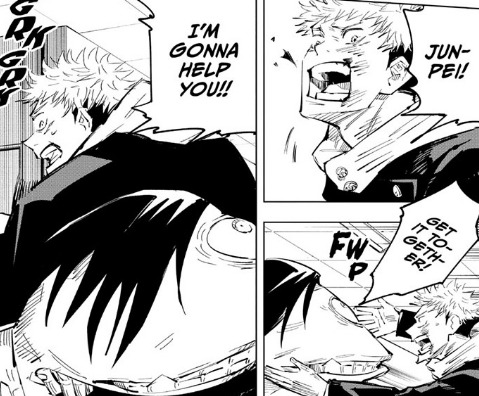
Of course Mahito challenges this notion of Yuji's. Early on Yuji says that he feels like life will be worth less, if he has to kill people. Then Mahito presents Yuji with people he cannot save, who it would be a mercy to kill because they are living in pain. Before finally being shown that all of his efforts to save Junpei completely failed.
If he can't help Junpei in the end, then for Yuji what was the point of meeting him? What was the point of Yuji trying to sympathize with him, if he failed and Junpei dies such a gratuitous death.
I think Junpei is one of the standout deaths in Jujutsu Kaisen, because in spite of the fact we know him so briefly his permanent impact on Yuji lingers. He's the part of a pattern where every time Yuji tries to play hero and protect life he utterly fails. He's confronted over and over again with what are "meaningless deaths" in his own words.
Until Todo literally spells it out for him. That if he tries to keep searching for meaning in death, he's going to go insane. He was in danger of walking down the exact road that Geto was.
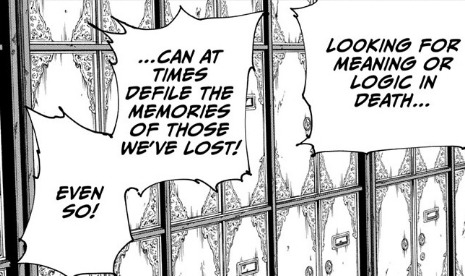
So, Yuji is nearly broken by the meaningless deaths of Nanami, Nobara and the thousands slaughtered in Shibuya in succession, and Todo's advice is basically that if you keep staring at all of the death in front of you it's not going to help at all, you're just going to drive yourself crazy.
Yuji is trying to use Nanami's death as an excuse to give up searching for meaning. If death is the end result of life, then for a moment Yuji thinks it's no longer worth living. He even tells himself to die after the massacre at Shibuya.
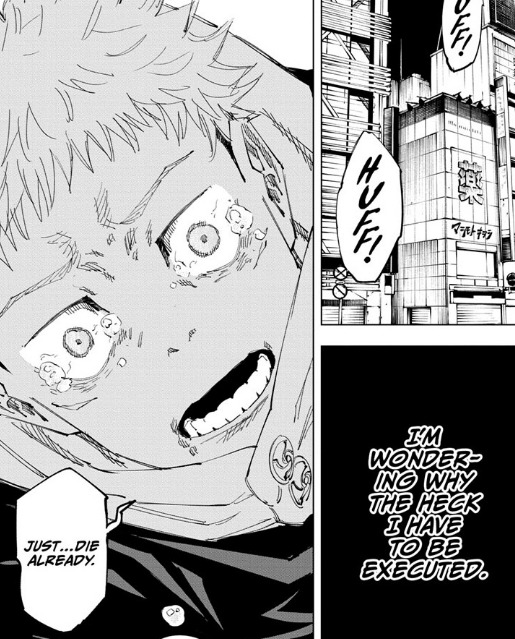
Then, there is Mahito who fully believes that because everything dies life is equally worthless. Since there is no meaning you are entitled to do whatever you want, because all life is just competing with each other.
Full rules of the jungle logic. Why does the deer have more right to life than the wolf, when they're both competing for survival? The wolf eats deer not because it's evil, but because it's what it does.
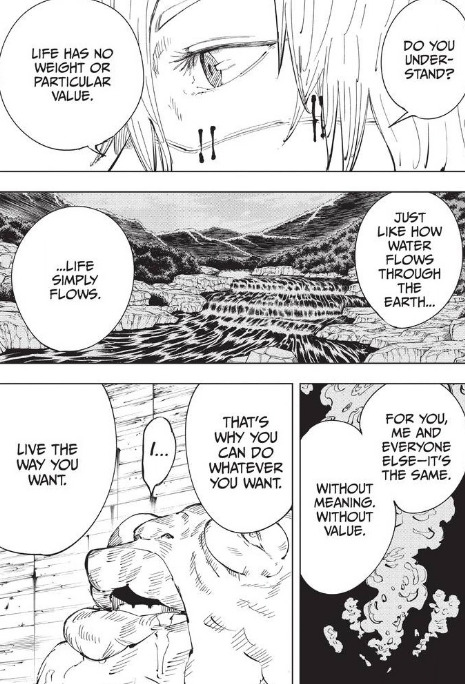
Mahito clearly sees himself as the wolf and humans as the prey. He doesn't need to think about the reasons why he kills humans, that's what curses do, the same way that wolves eat deer. It's just natural instinct. A wolf doesn't ponder the meaning of life. It just eats to fill it's stomach.
Mahito is trying to disprove the notion to Yuji that life has meaning or there's a greater meaning behind his actions. Which is what his speech is about, you save people without thinking and I kill people without thinking. There's no meaning for our actions, Curse and Humans are just different species that are trying to wipe each other out for survival.
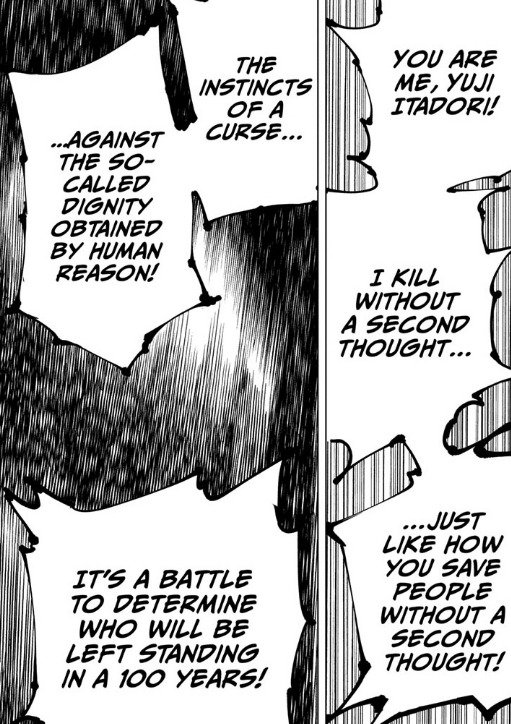
What's interesting about them and why Mahito is the true mirror to Yuji, is that after their confrontation, their philosophies completely flip. Yuji decides to accept Mahito's words that there's no meaning to life. He won't search for meaning in death anymore, he'll just play his role. Sorcerers kill curses because that's their job, he's just another part of the food chain too.
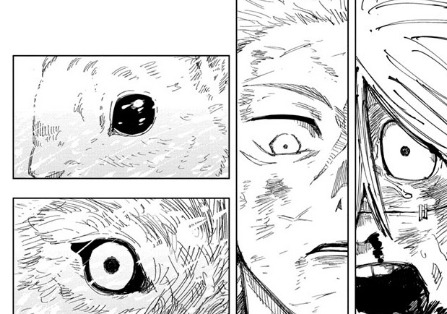
In that instant Yuji becomes the wolf and Mahito the rabbit. Mahito also flips his ideals. If he were a true believer in the right of the strongest, then he would have just accepted his death when Yuji was stronger. Jogo did. He even said it doesn't need to be him in the world of curses as long as the world he wants is brought about.
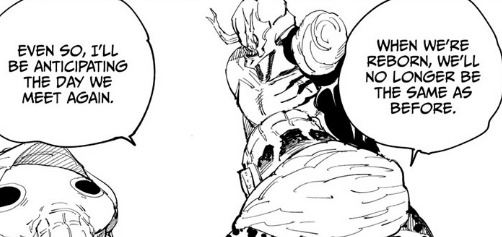
Jogo knows they'll just be reborn anyway, even if they wont' be the same but he can accept that. That's the nature of a curse. However, Mahito who's name literally means "true human" and is the most humanlike of the curses wants to retain his individuality.
Yuji rejects his individuality to become a cog. Mahito runs away to try to preserve his life and his individuality instead of just accepting death and reincarnating and he ends up being turned into a tool by Kenjaku. It's a fun reversal, because as I said above death is a mirror.
In fact Mahito comes full circle in the last piece of dialogue in the entire series to show that even Sukuna was able to accept death as a part of life in the end, and accept that maybe he can change in the next life. Mahito who is paralyzed by his fear of death and believes that death negates meaning however, is the only one who remains eternally stunted as a child.
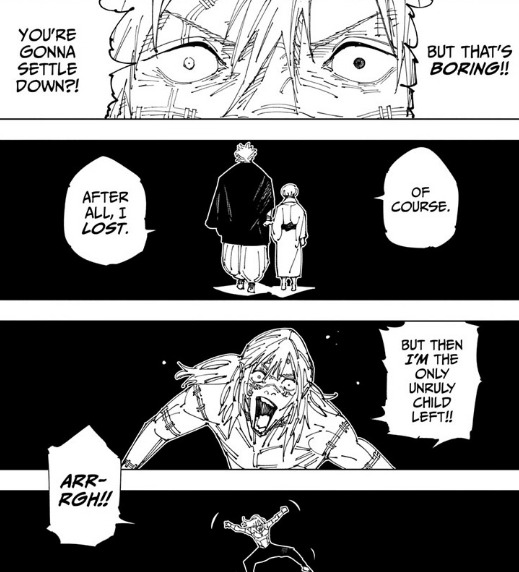
70 notes
·
View notes
Text
The Anti-Bojack: Anti-Intellectualism and the Death of Substance
In the blog essay “Staging Philosophy: the relationship between philosophy and drama”, Kristen Gjesdal opines on the home of philosophy. Many today would consider philosophy a relic of a bygone era with names such as Keikegaard, Voltaire, and Neitzsche. Many don’t know, however, of the close relationship philosophy has always held with the arts. Gjesdal mentions Ibsen in the article, discussing how many playwrights of the time were avid students of philosophy and how many philosophers regarded the arts highly. Nietzsche spoke of social leaders, specifically the religious leaders of his day in Beyond Good and Evil when he wrote, “Men, not great enough, nor hard enough, to be entitled as artists to take part in fashioning man.” Frankly denouncing the power and influence held by the religious men which he felt was more appropriately left in the hands of artists. In fact, Nietzche considered art the definition of culture and hence why he says that artists are the ones who should be responsible for shaping society and defining what it means to be “man”. As such, the expressions of art, poetry to cinema, is a definition of man and inherently a philosophy.
Bojack Horseman is an openly philosophical series that plays with existentialist schools of thought. Having liked several tweets endorsing the comparison of her work to that of Raphael Bob-Waksberg, Vivienne Medrano demands her work be valued the same way. From being favorably compared to Bojack Horseman to being praised as the “Anti-Bojack”. Which begs to question, what does that even mean? First let’s discuss the Philosophy behind Bojack Horseman, then compare the tweets Medrano liked and her series to that of Bojack directly, and then study the overlapping themes and why Medrano’s style of writing makes her storytelling a mockery to the art.
Existentialism in particular has been the darling of the theater for about the last 150 years, though generally ridiculed by “proper” society. For a philosopher to be labeled a nihilist or existentialist was often a denouncement of their school of thought, often for their general rejection of fundamental social structures like ethics. In 1942, writer Albert Camus published his essay The Myth of Sisyphus, rebranding traditional existentialist concepts as Absurd philosophy.
Camus begins his work poised with the question of suicide and whether life is worth living at all. He argues that life is inherently meaningless, an idea originating with Kierkegaard, but while the latter sided with finding purpose in constitutions like religion, Camus argues that religion itself is a philosophical suicide. In the Routledge encyclopedia of philosophy by Charles Guignon, he writes of the criticisms levied against existential and absurdist philosophies in a society awash in moralist anti-intellectualism. He opens this section by saying, “Existentialism has been criticized from a number of different angles. One line of criticism holds that the emphasis on individual freedom and the rejection of absolutes in existentialism tends to undermine ethics; by suggesting that everyday life is ‘absurd’ and by denying the existence of fixed, binding principles for evaluating our actions, existentialists promote an ‘anything-goes’ view of freedom that exacerbates the nihilism already present in contemporary life.” Which comes from this negative misreading of nihilism.
In their video Nihilism: Are We Missing the Point, youtuber Michael Burns of Wisecrack tells an anecdote of his time in grad school where he paraphrases his professor as saying, “This idea of the constant misreadings of Nietzsche’s writings on Nihilism leads to, his words, angry seventeen-year-old atheists.” Which tends to be the issue when discussing concepts such as nihilism, existentialism and absurdist philosophy. Nietzsche, the credited father of the school of thought, is often taken out of context or his views distorted by society’s sensibilities. For one, the quote given earlier extends further into a condemnation of religion by saying, “Such men, with their "equality before God," have hitherto swayed the destiny of Europe; until at last a dwarfed, almost ludicrous species has been produced, a gregarious animal, something obliging, sickly, mediocre, the European of the present day.” Which many an angry seventeen-year-old and moralist has seen as an endorsement of the might-is-right philosophy that nihilism is credited with.
To a lesser extent, Camus writes in The Myth, “I must say what counts is not the best living, but the most living”. It feels like it should be rather straightforward then, the concept of the thought. More equals better, and Camus practically says as much when he later writes “Why should it be essential to love rarely in order to love much?” However, if one follows the first quote to its natural conclusion, he continues, “The most living; in the broadest sense, that rule means nothing. It calls for definition.” His wording may come off confusing as the essay is translated and the theories involved are dense, but Camus clarifies that “most” could mean the sheer number of experiences or the depth of the experience. He is not saying one or the other is the correct answer, but that both are equally valid ways to live one’s life. The focus, then, is not on directing anyone how they should live, but in the manner they should do so. He says, “It is not up to me to wonder if this is vulgar or revolting, elegant or deplorable … Suppose that living in this way were not honorable, then true propriety would command me to be dishonorable.”
Camus, and even Nietzsche, argue that truth is the only ultimate value. It throws back the moralist dilemma by arguing that living to a code of ethics or values when one is not truly that sort of person is to live reprehensibly. Better is it to live authentically “without appeal” as Camus says, than it is to live the lie of following the rules.
Thomas Polzler from the University of Graz in Austria wrote a 2014 article titled “Absurdism as Self-Help: Resolving an Essential Inconsistency with Camus’s Early Philosophy”. Personally, I fundamentally and adamantly disagree with his assessment that there is any sort of inconsistency in Camus’s writings. Camus’s books of The Stranger, The Plague, and The Fall are not inherently inconsistent, but depict his philosophy in layers.
Like water painting, Camus starts with a thin veneer of color, a loose and almost detached protagonist in Meursault from The Stranger. He is a man aware of the absurd as an individual, the story maintaining the focus of a man living aware his life means nothing and thus seems to have an almost neurodivergent disinterested in the world beyond himself. What he feels in the moment is all that matters, so when he commits murder out of feeling uncomfortable from the heat of the sun and the painful blinding of the light, he is then juxtaposed with the ethical society he exists simultaneously within and outside of. Meursault is held up as a sociopath for not wishing to see his mother’s body the night before her funeral and smoking by her coffin. Because he does not cry at her passing, he is deemed a danger to society. Because he goes on a date to a comedy picture the day after, he is denounced as a menace. None of which has anything to do with the man he killed. The trial highlights the absurdity of ethical society and how the moralists demand the appearance of values over actually having them.
In fact, the trial of Meursault closely resembles that of Bojack and Sarah Lynn. The end of season 3, Bojack and Sarah Lynn go on a cross-country drug-fuelled bender to apologize to people Bojack has hurt in the past, stopping at the Griffith Observatory where Bojack has a profound revelation. He talks about living in the moment and how neither the past or future really matters at all. What you did and your legacy don’t matter if you cannot exist now. It is this moment that he realizes Sarah Lynn is not responding. It isn't until season 6 that it is shown that Bojack waited before calling the police and thus played a hand in Sarah Lynn's death. He is taken to civil court by Sarah Lynn's mother and step-father and made to pay them a fine for his involvement. However, is it really justice when Sarah Lynn's mother exploited her in the business and never once supported Sarah Lynn for what she wanted and what her dreams were, or even just who she was? Can one argue that it is justice when Sarah Lynn was sexually abused by her step-father throughout her childhood? Yes, Bojack does have responsibility in Sarah Lynn's death, but so do her parents. The absurdity of it all being that in no way could there ever be justice for Sarah Lynn.
Brief mental health sidebar. While I have to expressly disagree with Polzler’s reasoning, I do agree with his conclusion. Philosophy and especially Absurd existentialism are powerful tools in the journey to self improvement. It is both the line from Bojack where Diane says "That's the thing. I don't think I believe in 'deep down'. I kind of think all you are is just the things that you do." And Dr. Wong in Rick and Morty when she says, “You seem to alternate between viewing your own mind as an unstoppable force and as an inescapable curse. And I think it is because the only truly unapproachable concept for you is that it's your mind within your control … You are the master of your universe.”
It may be shocking to know that Medrano was not a fan of Dr. Wong, considering the scene all about telling and not showing Rick’s problems. However, this is after two and a half seasons of witnessing Rick’s shortcomings and Dr. Wong is not telling Rick’s problems, but rather identifying the solution. In both the words of Diane and Dr. Wong, who we are, comes down to the choices we make. There is no moral argument being made with either of these comments. Bojack asked Diane to tell him that he’s actually a good person deep down. That he means to be good, that despite his actions he doesn’t want to hurt anyone and that his bad behavior is the fault of his emotionally unavailable and narcissistic parents. So really, he isn’t a bad person. Whereas Dr. Wong calls out Rick’s behavior as a choice because Rick knows he is making these choices.
The difference between Rick and Bojack is the level of personal awareness and responsibility. Rick knows he has the power to change, but simultaneously so miserable but is so afraid of change that he turns himself into a literal pickle and risks his own death over confronting his own choice to stay the way he is. It is easier for him to justify his lack of trying by simply claiming this is just what it means to be as smart as he is. Whereas Bojack feels helpless. Bojack was not set up for success as a child, his success was never validated by his mother and thus he never valued himself, and every time he tries to change he has no internal fortitude to keep from backsliding at the first sign of defeat. Rick knows everything that is making him miserable is himself. Bojack externalizes his misery and thus also externalizes the solution to his problems, which is why he lets himself return to square one whenever things don’t go his way.
Absurdism is the recognition that life is meaningless and thus we have two choices: Live or die. But these concepts are not so straightforward when discussed. To live, in Camus’s philosophy, is to live authentically to oneself. That may sound like Rick’s situation of accepting things as they are, but that is only true in the case of the individual genuinely wanting to be that way. Authenticity is a dichotomy consisting of both how we behave and how we feel. In the case of Rick he lies, cheats, manipulates, and behaves cruelly towards his family. However, it is implied and later revealed that Rick genuinely cares about his family, but is too afraid of experiencing loss to really let them in. So he’s abusive and insulting, keeping his family at an emotional distance that keeps them around, but never too close, making Rick miserable. He really wants his family, so his feelings are at odds with his behavior. So in reality, him claiming “this is just how things are/who I am” is just as weak an excuse and removes agency over oneself as Bojack saying “It’s because my mother was never there for me.”
The actions both Rick and Bojack partake in are what Camus would call a philosophical suicide. Concisely put, to commit a philosophical suicide is to remove one’s sense of agency in their own life. How can one claim to be living when they have no effect on anything including themselves? You would exist in a void no different than a dreamless sleep. Your actions are meaningless, your thoughts are meaningless, your feelings are meaningless because you are a passenger to the act of living. Everything else has power, everyone else can influence you, so you may as well be nothing. Camus includes religion in this section of his philosophy, as living for something other than yourself is the same as not living at all. And this encompasses Ethics.
There is a massive difference between being kind because you are supposed to, and being kind because you want to. This delves further into living inauthentically and how that mere act alone results in misery. Even if one is to behave in a way deemed “right” without making the choice, they will inevitably become resentful. There is no such thing as faking it until you make it. One has to actively choose and change themselves on a fundamental level to find happiness, and that takes work. Just as Dr. Wong says, “It’s just work. And the bottom line is some people are okay going to work and some people, well some people would rather die.”
Which gets to the main point.
Medrano’s liking of a series of tweets calling Blitzo the Anti-Bojack has both infuriated and confused me. I suppose that I should be embarrassed at the latter since it's obvious both Vivienne and her fans lack basic media literacy. It’s actually rather spectacular just how badly they misrepresent the situation of the characters in the narrative. I can only break this down comment by comment.
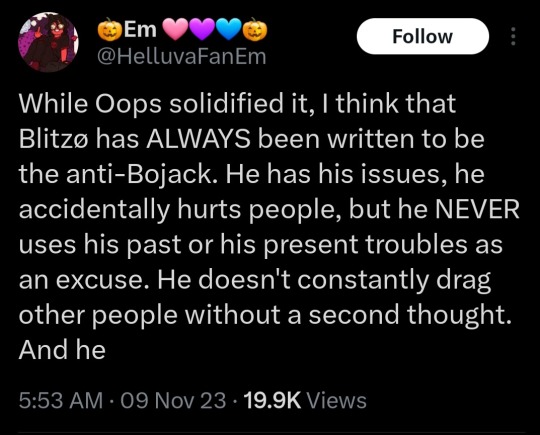
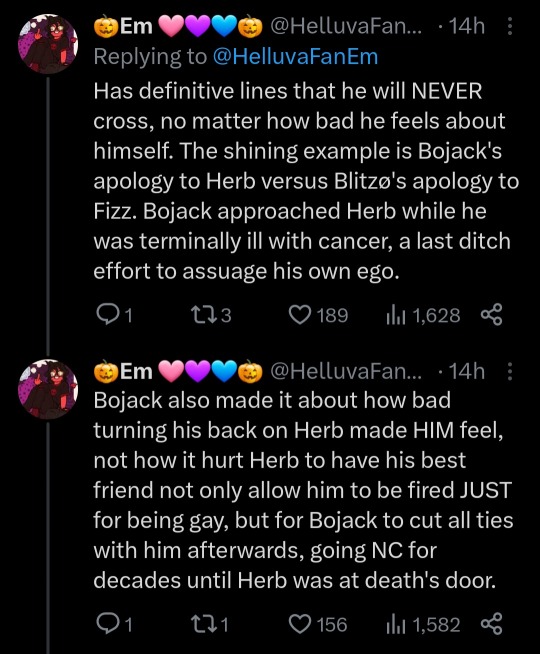
For one, Bojack’s entire character is that he doesn’t intentionally hurt others. He has his reasons that fundamentally comes from a weak sense of self associated with a child who never had the emotional support he needed growing up. Those aren’t excuses, those are the reasons. Bojack has an unhealed inner child who wants to be a good guy, but he is so caught up in his self-loathing and resentment that he doesn’t do anything about that inner child. Instead he indulges these immature emotions through self medicating with drugs and alcohol, lashing out, promiscuity, and careless spending. These are the symptoms of the problem, the problem does lie in past trauma. The issue is Bojack doesn’t see the solution as himself, but someone or something else. In my post comparing Bojack and Todd’s relationship to Blitz and Moxxie, I pointed out how Bojack and Blitz treat their “closest friends” exactly the same by verbally abusing them and tearing down their abilities. While not always consciously intentional for Bojack, it is to keep Todd feeling codependent on Bojack and thus never leaving him which is abusive and manipulative. For Blitz, the narrative says it's because he is aware of his behaviour and is intentionally pushing Moxxie to be better, which is abusive and manipulative.
My point herein being that these are the same people. There is no Anti-Bojack happening here. If anything, Blitz is more malicious in his abuse seeing as he appears actively aware and intentional in how he mistreats Moxxie. Bojack is abusive towards Todd, but in a way that is a reflection of Bojack. And the series acknowledges how Bojack's inability to be alone actively harms his other relationships. Not just Todd.
In one way, however, Blitz absolutely is the Anti-Bojack. Blitz externalizes the source of his behavior to a character failing on Moxxie's part. And the series reaffirms and justifies Blitz's abuse as okay.
The other misconception of this post is thinking that an explanation is an excuse. Creative Screenwriting did an interview in 2019 with Raphael Bob-Waksberg’s process and philosophy of writing Bojack Horseman, quoting him for the title of the article, “Characters should be understandable in their vulnerabilities.” What Medrano’s fans fail to do, fundamentally, is understand. Their opinions and twitter orations are so barren of understanding that one must ask if they simply choose to ignore what does not serve their narrative or if they really are just incapable of comprehension.
They see Blitz’s mother’s death as a reason for his attitude more than his behavior. His behavior then necessitates that it needs to be excusable. As such, Blitz cannot actually make mistakes. Things happen by chance rather than a deliberate choice on any of the characters’ behalf. The fire in Oops wasn’t a mistake made by Blitz, if it is anyone’s mistake, it is the no-named imp who lit the candle before getting to the room. Blitz didn’t intend to bump the other performer, he just happened to turn at that moment. His mistake, then, is one that only makes sense on a metanarrative aspect. His mistake was deciding not to confess his feelings to Fizz. Which… no. As novel as the concept of the butterfly effect was in 2015, the fundamental nature of something inconsequential being attributed to a disaster negates blame. No one is going to blame the butterfly for a hurricane. Similarly, Blitz’s decision to not confess has nothing to do with the fire, in fact the fire itself is not even his accident. His contribution begins and ends with accidentally bumping the other imp; a situation that would have been entirely harmless if not for another character’s unrelated decision made off-screen.
Additionally, Blitz is a heinously insufferable individual who has been nothing but insulting and abusive to his “friend” throughout the series. He sexually abuses Moxxie in Harvest Moon by touching his penis against his will. He threatens to rape Moxxie and Millie in Murder Family. Blitz humiliates Moxxie through emasculation by masculinizing Millie over Moxxie, mocking Moxxie’s anatomy through his weight and genital size, and degrading Moxxie’s hobbies and abilities. Often without any prompting whatsoever and for Blitz’s own personal enjoyment. Blitz simply is a malicious individual, and at one point the series seemed to know that. The issue isn’t that Blitz is an awful person, it’s the lack of acknowledging that fact. The fans and Medrano conveniently ignore who this character is and what he has done to justify him instead of seeking to understand him. This is a running theme throughout the show.
I also briefly compared the scene in Oops to Herb and Bojack in this post, but I didn’t focus so much on the characters and more the metanarrative reason why Bojack worked and Helluva Boss didn’t.
Here, let’s look at why Bojack went to see Herb: Because Herb told him to. Unlike the scenario between Fizz and Blitz where they didn’t see each other for fifteen years and then conveniently run into each other and just so happen to be spotted by Crimson and Striker who, for some reason, know all about Fizz and Ozzie being a thing and they just keep Blitz around because … he’s the main character. Sure, one could argue both Crimson and Striker have a personal thing against Blitz, makes you wonder why they didn’t, you know, do anything to him? No torture or revenge of any kind, he’s just there now. Conveniently tied up and kept with Fizz instead of literally anything else they could have done with him. There is no internal logic to the characters as to why things turn out this way. As seen in the Mammon episode, it's a metanarrative compulsion to make sure Blitz is in every episode regardless of whether it makes sense or goes anywhere, or not.
Another sidebar, but the fact that so much of the series is not able to be explained within the narrative and requires an understanding of how Medrano and her team formulate a script is a huge issue. It removes the ability to properly dissect the characters as individual people and necessitates a reading of them that is how Medrano wants the audience to think about them. When it comes to the character dissections, it is effectively impossible to have a complete or coherent reading in regards to the literary philosophy of the Death of the Author. You have no story or character if you remove Medrano. The world as a whole completely falls apart unless you inject it with her metacommentary and narrative intention like one would preserve a corpse through glycerin. There is absolutely no substance here. And the longer she goes on, trying to compile the whole show into a coherent narrative of its own is like building a skeleton with a human ribcage, an ostrich spine, an elephant skull and the lower half of a barbie doll.
Bojack calls Herb after finding out he is dying from cancer, Herb tells Bojack to come visit him. He refuses to talk to Bojack any other way, and Bojack is compelled to go by his guilt, not ego. Herb calling him to his house obliterates Bojack’s ego, this is Herb’s home and he is the one being summoned. This is where Herb has the most power compared to, say, over the phone. This is not only a move of superiority on Herb’s part, but an act of submission on Bojack’s. Herb forces Bojack to come to him. Once again, this is what power dynamics look like. But, despite the resentment and awkward bitterness, he does want to see Bojack.
I don’t know how many times I can articulate this. Herb is the one in control and he is the one who wants to see Bojack and he is the one calling the shots. Not at all comparable to Fizz being kidnapped, forced to interact with Blitz and then wholly reliant on him due to the narrative in order to facilitate this forced reconciliation. Herb and Bojack are people with complex feelings and agendas. Blitz and Fizz are two dolls being smashed together and held in place by the will of a childish god.
Second, the reason Bojack calls Herb is because he feels guilty, not for abandoning Herb but because he betrayed Herb. He told Herb he would stand with him and walk off the show if they tried to fire his friend, but according to Bojack, he was a coward and didn’t keep his word. He feels guilt for that, he regrets it. But when he apologizes to Herb for it, Herb corrects him. It isn’t because Bojack didn’t keep his word, like the horse man thought, it was because he thought the betrayal was more important than their friendship.
He’s a coward, but not for staying on Horsing Around. He’s a coward because he didn’t believe in their friendship. They were together for years and Herb thought that meant something, but Bojack avoiding Herb and never reaching out to him showed how little their friendship meant to him. And it wasn’t because Bojack didn’t care, Herb knows that. And that fact is necessary to understanding the sequence. Bojack didn’t value the friendship because he thought he was valueless. He avoided Herb because he thought Herb would never forgive him, because that is how little Bojack thinks of himself. Him calling Herb is the active display of him still not forgiving himself, so he needs Herb to do it for him. And Herb knows all of this.
“You know what your problem is? You wanna think of yourself as the good guy. Well, I know you better than anyone else and I can tell you that you're not. In fact, you'd probably sleep a lot better at night if you just admitted to yourself that you're a selfish goddamn coward, who takes whatever he wants, and doesn't give a shit about who he hurts. That's you. That's BoJack Horseman."
Bojack has no value in himself, leaving him extremely fragile. So he took what he wanted, he took their relationship and defined it for both of them. He ran away, protecting himself while determining that this is what Herb would want, and left Herb alone and powerless even in his closest friendship. Which is why Herb demands Bojack come to see him, it’s Herb reclaiming his power in the relationship. And all of this only has any meaning if you clearly define the fact that Bojack apologized for the wrong thing.
There’s an alternate universe where Bojack doesn’t go back and apologize at all, and he and Herb rebuild their friendship anew in Herb’s last days and they simply, quietly agree to start over. Because that’s not off the table. Herb still values the telescope. He still values their friendship. Bojack, once again, takes it away. And Herb, a dying man, fights viciously to keep hold of it. Him not forgiving Bojack is not wanting his friend back, if anything, it’s because he desperately wants Bojack back that he won’t forgive him.
The telescope isn’t just a metaphor when it breaks. It's the symbol of their friendship the entire time, and the physical actions taking place over it are a screenshot of what happened. Bojack took their friendship and left with it. But it meant something to Herb, and you would only know that by how he fights over it now. And when it breaks it shows that, because of Bojack and his cowardly need to run away from his problems, their relationship is now, finally, beyond repair. Not because Herb didn’t forgive him. It wasn’t over when Herb didn’t forgive him. The telescope is literally on the shelf the entire time.
Bojack ended it, not Herb.
But just like Bojack, Medrano and her fans believe that forgiveness is the end all of the story. It’s why so many people were not invested in Fizzarolli and Blitz makeup. Because Fizz just forgiving Blitz makes everything they went through meaningless. It strips the characters and what they went through of depth and nuance in a single moment. It also validates Bojack's general mindset in the belief that one moment can fix a systemic problem. In this case, Medrano isn't the Anti-Bojack, she just is Bojack.
The issue between Herb and Bojack wasn’t the job, or even the time. It was Bojack. And it is the failure of Bojack identifying the part of himself that resulted in this outcome, and not making the choice to do anything different that results in the end of everything. Maybe Herb would never have forgiven the Bojack who left him. But that’s why Bojack needed to be a different Bojack. And he wasn’t.
Wrapping this back around to the start of the essay and how Absurdist philosophy plays into Bojack intrinsically, Herb says exactly that truth to Bojack. That if Bojack was only honest to himself and lived authentically, maybe he would be able to sleep at night. Because being good is less important than being real.
This reminds me of Jean Baptiste Clamence from Camus’s The Fall. A Frenchman in the seedy center of Amsterdam, a city encircled by canals like the rings of hell. He spends his nights in the bar just outside of the red light district, drunk off his ass, it is uncertain if he is actually telling his story to anyone at all. Over the course of four nights, he tells his story of his fall from grace. His self exile to Hell after being unable to cope with his guilt. He tells so many stories of himself, egotistically claiming he has the lost panel of the Ghent Alterpiece in his apartment, the piece titled The Just Judges.
Even his name is a plea for repentance. John. Baptist. Clemency. He claims to sleep with Judges looming over him. Words endlessly flow from him and he confesses his sins.
It’s when he fesses to witnessing the suicide of a young woman in Paris that he explains why he ran away to Netherlands. He says how she called for help after jumping into the water, but he quickly fled the scene, hearing the splashing below become eerily silent. One could argue that he couldn’t do anything. In the Paris winter, the freezing water of the canal could kill them both, let alone the dangers of trying to save someone who is drowning. The main concern being the victim drowning their savior in a frenzied panic of keeping themselves above the water. It could be said that he did the only thing he could. However, he knows she was aware he was there, so she called out to him specifically when she came to her senses. No one witnessed the incident or knew he was there but her, and no one could fault him for doing nothing.
But he feels the guilt in himself, and thus runs away.
Jean-Baptiste, Bojack and even Diane all have the same mentality. They fetishize their misery and trauma, making themselves important through the loops of suffering they inflict on themselves. Thinking that because the events happened to them, it must mean they are somehow special. That their damage meant something out of all the other people on this planet who suffer. That because they felt alone and responsible, they are a mythical chosen one selected from the masses to do something. They find value in the negative self-image they have, their pain being their purpose.
Because if it didn’t matter, why did it happen to them?
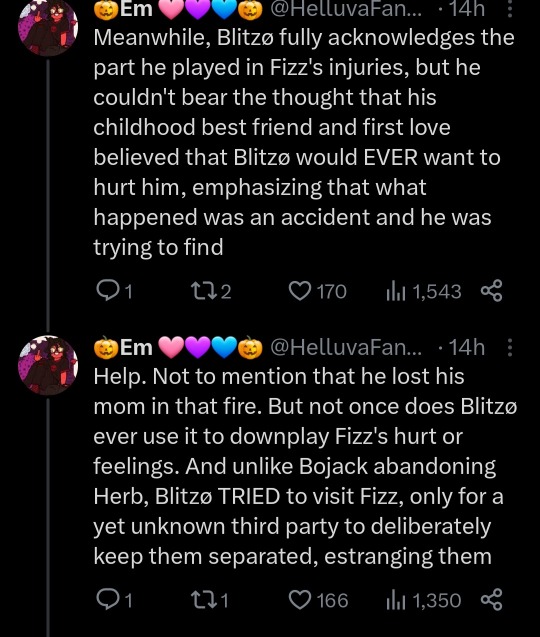
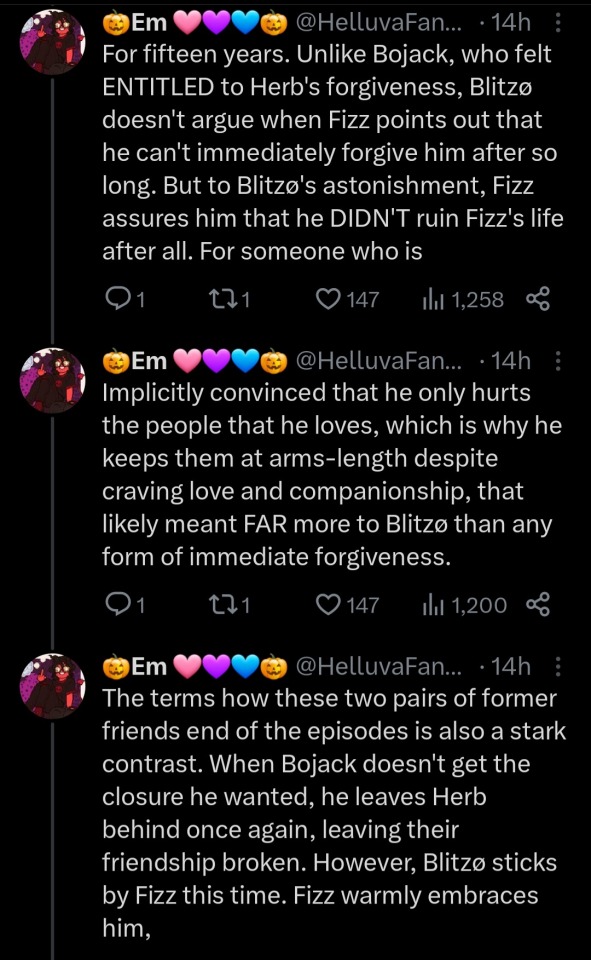
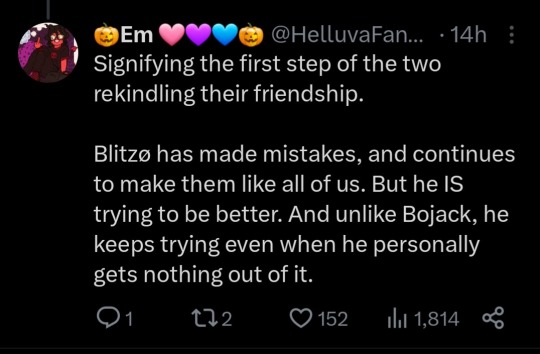
This is where I normally would keep just ripping apart the arguments, but frankly, there isn’t one anymore. For one, the original poster just blatantly lacks any fundamental understanding of Bojack as a series since the entire premise of the show is every season Bojack tries to change.
On a narrative basis, the lack of intentionality on Blitz’s part absolves him from needing forgiveness. Fizzarolli forgiving him holds no weight because Blitz didn’t intentionally set the fire, he didn’t see Fizz in the explosion when he ran away, he didn’t not try to see Fizz in the hospital and then Medrano puts the cherry on top about how Fizz’s life is actually better because of everything that happened. It’s equal parts boring and vile. The conflict is artificial, the resolution is repulsive and contrived. There is no depth to these characters and Medrano actively removes depth, either because she herself lacks the ability to comprehend it or because she knows her fans are incapable of doing so.
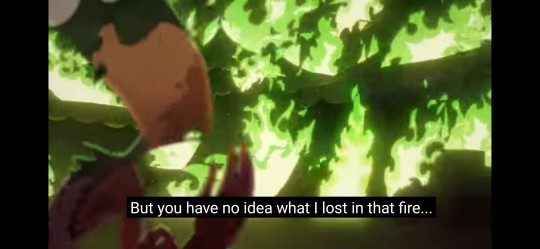
Also, let's just not comment on how this line explicitly overshadows Fizz's trauma. Everyone knows you don't end an apology with "but". That negates the whole apology. This is literally "I'm sorry you got hurt and I can never make that up to you, BUT my mom's dead so you don't even know what it's like being me and feeling responsible for that."
While the writers of Bojack sought to make their characters understandable and thus empathetic, they at no point excused or retconned the behavior. The writers on Bojack didn’t do anything to justify their characters in order to control how the audience felt about them. They were showing that the characters were well rounded, had reasons, why they had those reasons, what core memories made them who they are today. And the audience had the choice in how they responded to the characters. Medrano needs her audience to feel the same way about her characters as she does in order for the story to work, because she has never put forth the effort of actually telling this story.
One does not need the interviews with Bob-Waksberg to understand his cast and their story. Everything a viewer needs to know can be found in the show proper. There are not huge points of context happening just over there, off screen, between episodes and relegated to background details. Everything relevant to these characters and their stories is in the show. That has not and at this point never will be the case for Helluva Boss. So in many ways, yes. Helluva Boss is the anti-Bojack.
That's not a good thing.
#tw sa mention#philosophy#bojack horseman#bojack horseman spoilers#helluva boss critical#helluva boss critique#helluva boss criticism#vivienne medrano#vivziepop#vivziepop critical#spindlehorse critical#spindlehorse criticism#vivziepop criticism#long post#lots of repetition in places#i get philosophy is dense#its sometimes hard to grasp#especially for this fandom#sources#helluva long post#writing critique#critical thinking#essay writing
254 notes
·
View notes
Text
International Women's Day — Key Works in the History of Feminist Literature
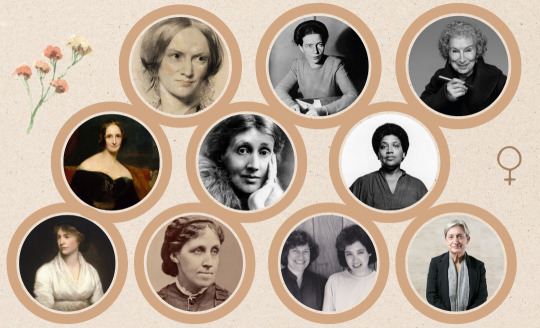
For this year's International Women's Day, I got inspired to make a little syllabus of key works in the history of feminist literature. Starting in 1792 with Mary Wollstonecraft, all the way up to Judith Butler in the 90s, this selection intertwines some fiction by female authors with works of literary theory and feminist essays that I think dialogue meaningfully with each other.
1. A Vindication of the Rights of Woman: With Strictures on Political and Moral Subjects (1792), Mary Wollstonecraft
There's no other way to start a feminist syllabus: considered one of the first works of feminist philosophy, it was written in defense of rational education for women, after theorists stated that they should only receive domestic education. Seen by many as a foremother of feminism (the term itself would only be coined in the 1800s), Wollstonecraft's ideas would later shape the suffragette movement.
2. Frankenstein (1818), Mary Shelley
Mary Wollstonecraft 's daughter, Shelley applied her mother's principles throughout all of her work. Her most famous novel is not only one of the first works of science fiction, but a subtle feminist reflection on the monstrosity of patriarchal creation and how it can lead to destruction.
3. Jane Eyre (1847), Charlotte Brontë
Although its feminism is heavily debated, Brontë's novel is a compelling coming-of-age about a free-spirited, independent female protagonist who stands out in the landscape of 19th century literature. It also contains another character that would come to define a major female trope in literary and psychosocial debate.
4. Little Women (1968), Louisa May Alcott
As a declared feminist herself, Alcott gives agency for each March sister to choose their own individual paths in life, whilst also raising pertinent questions about women's rights in this deeply influential matriarchal narrative.
5. A Room of One's Own (1929), Virginia Woolf
This extended essay based on lectures Woolf gave in women's colleges draws a heritage of female writers (including authors such as the Brontës). Woolf's metaphors and evocation of "Shakespeare's sister" stand the test of time in this central feminist text.
6. The Second Sex (1949), Simone de Beauvoir
Considered a major inspiration for the advent of second-wave Feminism, this book was banned from the Vatican until 1966. Digging deep into the history and the then present condition of women, the existentialist philosopher recalls authors such as Wollstonecraft, Alcott, the Brontë sisters and Woolf.
7. The Madwoman in the Attic: The Woman Writer and the Nineteenth-Century Literary Imagination (1979), Sandra Gilbert and Susan Gubar
Drawing the title from a particular character in Jane Eyre, the authors study 19th century female writers such as the Brontës and Mary Shelley, while also dialoguing with some of Woolf's ideas in this cornerstone of feminist literary criticism.
8. Sister Outsider: Essays and Speeches (1984), Audre Lorde
In this collection of essays and speeches, the intersectional feminist author gives the spotlight to the experiences of Black and lesbian women, laying the foundation for a wide range of contemporary feminist theories.
9. The Handmaid's Tale (1985), Margaret Atwood
In her famous feminist dystopian novel, Atwood imagines a world that's overthrown by a patriarchal, totalitarian theonomic state, raising important questions on reproductive rights and the agency of women.
10. Gender Trouble: Feminism and the Subversion of Identity (1990), Judith Butler
A touchstone of third-wave feminism by prominent post-structuralist scholar Judith Butler, this book brings a pertinent discussion on gender (which they claim as performative) and identity, by examining the works of Beauvoir and other philosophers.
If this syllabus interests you, you can find PDFs of the first half (which is public domain), on this Google Drive that I put together! Good readings and happy Women's Day ♀️📚☺️
#book#books#literature#feminism#feminist#feminist literature#international women's day#mary wollstonecraft#mary shelley#frankenstein#jane eyre#little women#charlotte bronte#louisa may alcott#a room of one's own#virginia woolf#simone de beauvoir#the second sex#the madwoman in the attic#sister outsider#audre lorde#judith butler#gender trouble#intersectional feminism
23 notes
·
View notes
Photo

Søren Kierkegaard
Søren Kierkegaard (1813-1855) was a Danish philosopher and is considered to be the first existentialist, influencing such notable philosophers as Jean-Paul Sartre (1905-1980) and Martin Heidegger (1889-1976). His works are a reflection of alienation, angst, and absurdity, and include Either/Or (1843), Fear and Trembling (1843), and The Concept of Anxiety (1844).
He was embraced by his fellow existentialists for his belief in the importance of the individual against an apathetic, hostile society. However, unlike other existentialists, his body of philosophical works has a strong theological vein. Denise Despeyroux, in her book The Philosophers, wrote that Søren's life was filled with painful experiences, which colored his works – works that displayed "great dramatic and poetic power. They are filled with parables, aphorisms, fictitious letters and diaries as well pseudonymous and fictitious characters" (110). She added that his struggles with religious questions served as a "potent stimulus" for other writers and thinkers of his generation.
Birth & Education
Søren Kierkegaard was born on 5 May 1813 in Copenhagen, Denmark, to an affluent family as the youngest of seven children. His father, Michael Kierkegaard, was a successful businessman, while his mother, Ane Sørensdatter Lund, had been the one-time maid of Michael's first wife. Søren claimed his father was the most influential figure in his life. Unfortunately, he suffered terribly from anxiety and inner turmoil, and this Søren 'inherited' from his father. Michael was deeply religious, a member of a pietistic form of Lutheranism, and was convinced that because of his past sins – he had once cursed God – none of his children would live past the age of 33, the age of Jesus Christ when he was crucified. Coincidentally, five of Søren's brothers and sisters, as well as his mother Ane, would die before Søren turned 21. Only Søren and his brother Peter survived. To Michael, it was a sign of divine retribution. According to Jeremy Stangroom in his The Great Philosophers, Søren maintained that his childhood was "insane" and "he had come into the world as the result of a crime" (100). Regrettably for Søren, his father passed on his "pessimistic and gloomy religious outlook to his son" (ibid).
Despite a chaotic childhood, his education was "surprisingly normal," attending a distinguished private school – the Borgedydskolen – where he was considered an outsider, "lonely, aloof, and intellectually the superior to his classmates" (ibid). Hoping to become a pastor as his father had suggested, at the age of 17, he entered the University of Copenhagen, where he studied theology, philosophy, and literature. In 1838, while he was attending university, his father died, leaving him with a large inheritance. After graduating in 1840, he began the life of an independent thinker and writer, but it would be a life consumed by inner torment and angst, evident throughout his writings.
Shortly after graduating, he made the mistake of getting engaged to Regine Olson, ten years his junior. He regretted the engagement the moment it was made. One year later, in 1841, he broke off the engagement, believing that his melancholic temperament made him unsuitable for marriage and he considered her to be intellectually incompatible. The affair with Regine had a lasting effect on Søren and would appear in both his journals and other works. Free from an unwanted engagement and with a large inheritance, he was free to begin a career as a writer. Oddly, throughout his life, he only left Copenhagen three times, spending most of his free time walking the streets of the city or attending the theater.
Continue reading...
22 notes
·
View notes
Text
📺🧠💭📙 Sims Philosophy is DEPRESSING!
Video Overview
This video, created by the channel Reese, analyzes the Philosophy major in The Sims 2 University. The author explores each course in detail, explaining the philosophical concepts and references embedded by the game developers.
youtube
Philosophy Major Curriculum Structure
Freshman Year
First Semester: "What is the Meaning of This?!"
The course title playfully references existentialism and the search for the meaning of life. It touches on fundamental philosophical questions about purpose and existence, commonly explored by existentialist philosophers such as Søren Kierkegaard and Jean-Paul Sartre.
Second Semester: "The Refrigerator Light: Proof vs. Faith"
This course is a clever nod to epistemology—the theory of knowledge. The title riffs on the classic philosophical question: "Does the light in the fridge turn off when the door is closed?" It explores the tension between empiricism (knowledge based on evidence) and faith (belief without empirical proof). The video connects this to the work of David Hume, especially his Dialogues Concerning Natural Religion.
Sophomore Year
First Semester: "Old Dead Guys Who Thought Stuff"
This ironically titled course introduces major philosophers from antiquity and the Enlightenment. The "old dead guys" refer to thinkers like Plato, Aristotle, Descartes, Kant, and Nietzsche. The author also mentions natural philosophers such as Thales, Anaximander, and Anaximenes.
Second Semester: "Optimists and Other Idiots"
The title mocks philosophical optimists like Leibniz, who claimed we live in the best of all possible worlds. The course also explores ideas from Hegel and Kant about the progressive development of history and morality.
Junior Year
First Semester: "Philosophy's Place in the Neighborhood: Anywhere?"
This course satirically questions the relevance and practicality of philosophy in everyday life. The title plays on the idea that philosophy is both everywhere and nowhere—it can be applied to any context but is often seen as irrelevant.
Second Semester: "Existentialism: Depressing Yourself on Purpose"
An exaggerated portrayal of existentialism as a philosophical movement concerned with themes like meaninglessness, anxiety, and the absurdity of existence. The author references the works of Sartre, Camus, and Kierkegaard.
Senior Year
First Semester: "Who Controls a Pie Menu and Why?"
A meta-reference blending philosophical inquiry with The Sims’ interface. The pie menu becomes a philosophical problem about power, agency, and control, touching on themes of determinism versus free will.
Second Semester: "Senior Project: Preparing for the Fast Food Industry"
A satirical comment on the practical outcomes of studying philosophy and the potential gap between academic theory and real-world employment. The title reflects the stereotype that philosophy graduates may struggle to find jobs in their field.
Skill Requirements
To complete the Philosophy major, Sims must develop the following skills: - Cooking level 4
- Charisma level 4
- Logic level 5
- Creativity level 4
- Cleaning level 1
Philosophical Interpretations of the Skills
Cooking: A nod to the need for practical skills in a theoretical field, and a metaphor for combining diverse thoughts into coherent ideas.
Charisma: Highlights the importance of communicating complex philosophical ideas and may allude to the Socratic method of dialogue.
Logic: The most obvious requirement, as logic is the foundation of philosophical thinking.
Creativity: Needed for innovative thinking, exploring new ideas, and challenging assumptions.
Cleaning: A multi-layered reference to various philosophical concepts, including Wittgenstein's logical positivism, Kant’s categorical imperative, and Hume’s call to “clean up” metaphysics from meaningless speculation.
#sims 2#ts2#the sims 2#sims2#youtube#university#university ep#the sims 2 university#philosophy#major#Youtube
8 notes
·
View notes
Text
i read a post talking about tf2 lore, its characters, and the plot holes
it inspired me to write something i’ve been thinking about
-it’s a long one(again) and english is not my first language so if grammar wrong i tried-
the absurdism in tf2
in short, absurdism believes that human beings tend to find meanings in life, but no such meaning exists
now hear me out
tf2 lore is an exaggeration of the absurdity in the universe, whether valve intended or not
it sounds deep, but it isn’t, and it shouldn’t be
it all can be boiled down to: shit just happened for no reason
tf2’s main story is centered around a key word: meaningless
for example, people used to rocket jump to the 2nd floor for hundreds of years because stairs hasn’t been invented yet? an absurd and meaningless solution to such a simple question
another example, the core reason for the mercs to be fighting is a useless pit of gravel
it has always been a meaningless fight
everything happened, but nothing changed, all of the efforts are meaningless
the whole comics, the goal is to bring australium to the administrator, they went through all the trouble, half of them being dead and brought back alive, and for nothing
when asked about motivation, the administrator only replied with i forgor
they hinted again and again that there is a cause, a reason to fight, an answer, but at the end there is no meaning behind everything
and that’s what absurdism all about: we search for meanings when there were none
this is what i get from the comics: shits just happened for no reasons, so we move on, we let go, and we enjoy life with its absurdity
if we take a step back from the comics and look at this game as a whole, it shares a similar idea, but from a more existentialist* standpoint: the meaning are not given, but rather created by ourselves by choice
*(yes i love philosophical buzzwords! but i might be wrong tho, im not too familiar with existentialism)
i kinda believe that when valve developed tf2 they didn’t have a lore in mind, it only added later
the comics are built on top of the game, not the other way around, so it could be separated and looked at them individually
(another example is arcane and league, and the opposite will be marvel rival, being a game built on top of a story, which will be hard to separated the two and finds contradictions)
and that’s why sometimes the wiki and comics conflicts one another, even the mann comics series and update comic contradicted each other, because they are independent from each other
so what does it means? it means thinking too hard about tf2 lore is meaningless, for it has no meaning from the beginning
i used to be desperate to find an answer about spy and scout’s relationship, red spy is blu scout’s dad? but also is red scout’s? it doesn’t make any sense, and it doesn’t have any explanation
we only know that spy is scout’s dad, and that’s it, we only NEED to know spy is scout’s dad
my point is, i don’t think valve’s ambiguous approach to the lore is not necessarily a bad thing
because tf2 is not made for storytelling, it’s made for shits and giggles
all of the characters, they are empty shells, defaults, templates, they are built for it, for people to fill them with substance, because them being nothing means that they can be anything and everything
i believe that each individual piece of media about tf2 is an interpretation of the characters and the world around them, even the valve comics, it’s like a more officially recognized fan comic
im a somewhat optimist, i think it’s simple: when there is no right answer, every answer is the right answer
now, it’s important for me to know that you know i didn’t write this to argue with that original post
they mainly wrote about dehumanizing in tf2 lore and i found it quite interesting and convincing
i hope you can see we are talking about two different things
9 notes
·
View notes
Text
Reni Reviews
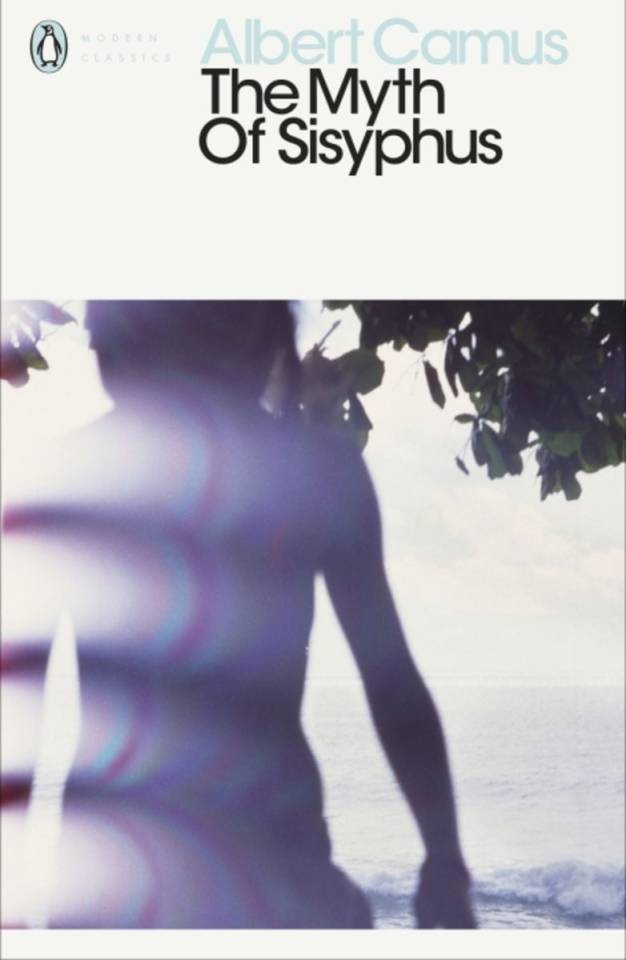
The Myth of Sisyphus (Le Mythe de Sisyphe) by Albert Camus
Finished: 17th June, 2024
Genre: Nonfiction, Philosophy
May be for you if you like: Absurdism, philosophy, existential questions
Synopsis
Influenced by works such as Don Juan and the novels of Kafka, these essays begin with a meditation on suicide—the question of living or not living in a universe devoid of order or meaning. With lyric eloquence, Albert Camus brilliantly presents a crucial exposition of existentialist thought.
Review
I will be completely honest: Albert Camus is one of these philosophers whose name gets thrown around by pretentious first year philosophy students a lot, and I've been always wary of "overhyped" philosophers - because how much substance is there to a philosophy that is marketable enough for the general public?
Yes, the sanctimonious, pretentious hypocrisy isn't lost on me lol.
So when I finally read his works, I was actually glad to have been properly schooled! I deeply resonated with his essays - every single one of them. I won't be getting into too much detail, but especially in times of crisis, his works can offer a great deal of comfort.
His essays, for me personally, boil down to several truths, the first one being
1) Existence is meaningless
But Camus is not a nihilist like Nietzsche, because his second truth is:
2) A meaningless existence is always happy.
We can allow ourselves to be happy no matter the circumstances. If Sisyphus is happy, then you are happy.
3) Life is absurd
because there is no meaning to anything. But this absurd nature of our very existence allows us to do whatever we want - even committing suicide. Whatever you do, you're cheating the system, because the system is so inherently flawed that no matter what we do, we are constructing ourselves out of it.
And this is comfort. For me, at least. If you took a different message from him, then let me know! I would love to discuss!
For those who haven't read Camus yet: Maybe give it a try! He might surprise you!
Rating: 🧁🧁🧁🧁🧁
#reni-reads#reni-reads the myth of sisyphus#the myth of sisyphus#albert camus#philosophy#absurdism#absurdity#booklr#book review#reni reviews#reni reviews the myth of sisyphus#book blog#bookworm
8 notes
·
View notes
Text
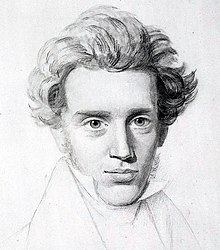
Søren Aabye Kierkegaard (5 May 1813) was a Danish theologian, philosopher, poet, social critic, and religious author who is widely considered to be the first existentialist philosopher.
“The most common form of despair is not being who you are.”
Søren Kierkegaard
#soren kierkegaard#philosopher#books#classic books#reading#books and reading#quotes#quote#inspiring quotes#life quotes#quoteoftheday#inspirational quotes#booklr#bookish#classic literature#literature quotes#bibliophile#books and libraries#lit#prose#spilled ink#book recommendations#literature#words#writers and poets#writing#classic academia
51 notes
·
View notes
Text
Destiel in Season 4 and 5 of Supernatural and Death of God
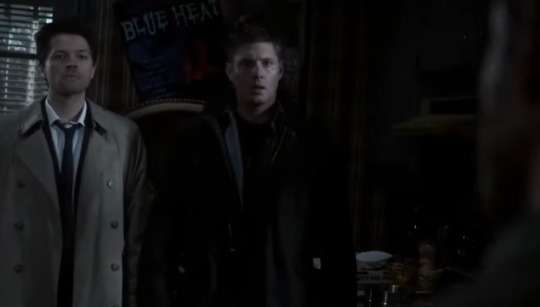
German philosopher Friedrich Nietzsche’s well-known phrase “God is dead,” introducing the idea of the missing God, laid the foundation for one of the most important topics in the 20th century Existentialist Movement. The possibility of God’s non-existence means that everything that is possible to happen can happen, and if everything is allowed, how can man choose? How can man know how to live? If everything is allowed, can we define right from wrong?
Such questions are asked on Supernatural, with the character Castiel first appearing at the end of the first episode in the fourth season, which marked the series’ introduction of Christian mythology as a central them ever since. Castiel, an Angel of the Lord, initially shows complete devotion to God and identifies as servant of heaven:
CASTIEL: We have no choice. DEAN: Of course you have a choice. I mean, come on, what? You’ve never questioned a crap order, huh? What are you both, just a couple of hammers? CASTIEL: Look, even if you can’t understand it, have faith. The plan is just. SAM: How can you even say that? CASTIEL: Because it comes from heaven, that makes it just. - 4.07 It's the Great Pumpkin, Sam Winchester
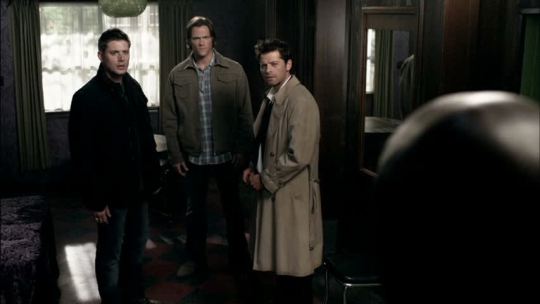
This argument on the morality behind the act of “purifying a city” or “taking one thousand two hundred fourteen lives” between Castiel and the Winchesters is not dissimilar with Danish theologian Søren Kierkegaard’s discussion on Abraham's sacrifice of Isaac. When Abraham was told that as a result of God's will that he must sacrifice his son Isaac, he was in a kind of either-or. If the message is genuinely from God, then he must sacrifice Isaac and it is the right thing to do; but if the message is not from God, then he would be committing what would be the very worst possible crime judged on the basis of Abraham's own view of human ethics.
The dichotomy here, between Castiel’s and Dean’s rationales, is that while the former believes there is a God and God and religion (in other words, heaven’s plan for earth) are the most important things, and man must do nothing but obey heaven’s command, the latter insists that there is no God and it is for man to take the total burden of responsibility for the world and for himself upon his own shoulders, with no one to give him any sign.
Though the former seems to suggest a lack of agency or necessity for decision making in moral judgement, as the plot unfolds, we see Castiel demonstrate a sense of uncertainty, the very secret he voices in the conversation with Dean in the episode’s epilogue.
CASTIEL: I’m not a… hammer as you say. I have questions, I have doubts. I don’t know what is right and what is wrong anymore, whether you passed or failed here. But in the coming months you will have more decisions to make. I don’t envy the weight that’s on your shoulders, Dean. I truly don’t. - 4.07 It's the Great Pumpkin, Sam Winchester
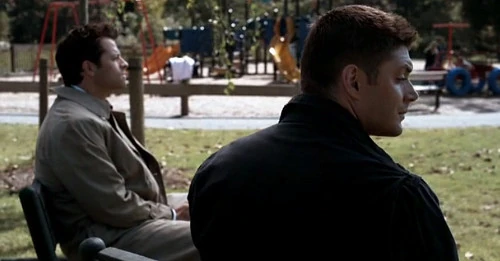
This mirrors Kierkegaard’s Abraham in his questions on God’s will. Indeed, how is one to know whether the command is from God or not? If an angel speaks to him, how does Abraham know it's not a hallucination? And if God himself speaks, how is Abraham, or Castiel, to know whether this is really God or whether the command is their own inward evil wishes? Nobody but Abraham, or Castiel, can decide and they cannot tell within his life whether he has done the right thing or not.
Perhaps it is this introspective nature in Castiel that draws him close to Dean, the human in his charge, and by implication humanity. Dean, a firm non-believer and what many, including himself, perceive to be as farthest from being servant of God as possible, detests the idea of God even in face of angels walking the earth.
DEAN: God? CASTIEL: Yes. DEAN: God. CASTIEL: Yes! He isn't in heaven. He has to be somewhere. DEAN: Try New Mexico. I hear he's on a tortilla. CASTIEL: No, he's not on any flatbread. DEAN: Listen, Chuckles, even if there is a God, he is either dead—and that's the generous theory— CASTIEL: He is out there, Dean. DEAN: —or he's up and kicking and doesn't give a rat's ass about any of us. CASTIEL glares. DEAN: I mean, look around you, man. The world is in the toilet. We are literally at the end of days here, and he's off somewhere drinking booze out of a coconut. All right? - 5.02 Good God, Y'all
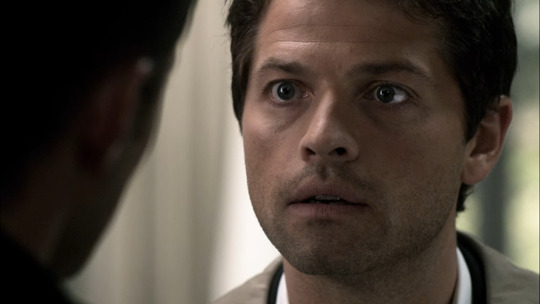
Dean has no intention of trying to prove that God does not exist, as one cannot prove a negative, but the very specific objection to the traditional concept of God above parallels with the simple objection in many existentialists work that is based upon the injustice of the universe. Albert Camus has given this same type of criticism in his novel, "The Plague", in which the priest, Padalu, confesses that he is not able to understand how there can be any justification so that even eternal paradise could cancel out the sufferings here on earth of one innocent child. Why, Deans asks, if God is all powerful, does man have to suffer? If God is merciful, then how can he sentence man, any man at all to eternal damnation?
There is an optimistic side to this. As the repetitive occurrence of the term “free will” on this show suggests, if God exists, man is nothing; but if God does not exist, then man is free to choose what he wants to make himself. But for Castiel to arrive at this destination, it first takes him to undergo a two-season long crisis.
ANNA: What do you want from me, Castiel? CASTIEL: I'm considering disobedience. ANNA nods. ANNA: Good. CASTIEL: No, it isn't. For the first time, I feel... ANNA: It gets worse. Choosing your own course of action is confusing, terrifying. ANNA puts her hand on CASTIEL's shoulder. He looks at it; she drops it. ANNA: That's right. You're too good for my help. I'm just trash. A walking blasphemy. ANNA turns to walk away. CASTIEL: Anna. ANNA stops. CASTIEL: I don't know what to do. Please tell me what to do. ANNA turns back. ANNA: Like the old days? No. I'm sorry. It's time to think for yourself. - 4.16 On the Head of a Pin

If God isn’t out there, then Castiel has nowhere to turn. This dreadful realization may best be articulated through Hazel Barnes’ analogy that as if one would try to judge a Ford car without any Mr. Ford. So long as there is a Mr. Ford or one of his agents, then one has a model, one has a blueprint and one can say that the car which is coming there off the assembly line is a perfect Ford or an imperfect Ford. But without a plan, one cannot judge a car, and without God, there is no plan for Castiel and there is no final point of reference by which he can judge his values, or right or wrong, or declare that he has lived up to his possibilities or not lived up to his possibilities.
Yet despite “choosing your own course of action” being “confusing, terrifying,” Castiel is not in total despair. Dean, the human equivalent of the burden of a self-creative life, provides reference for Castiel on how to live a life as if there were no God. I have concluded thus that in the context of existentialism Castiel seeks Dean and humanity for answers and view them as his destination.
Note: this article is MOSTLY arguments in Hazel Barnes’ Self Encounter 2: The Far Side of Despair.
54 notes
·
View notes
Text
💫 How to get into feminist literature ?
☆ From margin to center: feminist theory by bell hooks. She is most well known for her feminist theory that recognizes that social classifications (e.g., race, gender, sexual identity, class, etc.) are interconnected, and that ignoring their intersection creates oppression towards women and change the experience of living as a woman in society. In this beautifully written and carefully argued work, hooks maintains that mainstream feminism's reliance on white, middle-class, and professional spokeswomen obscures the involvement, leadership, and centrality of women of colour and poor women in the movement for women's liberation.
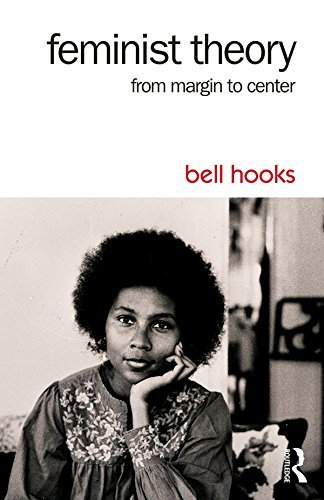
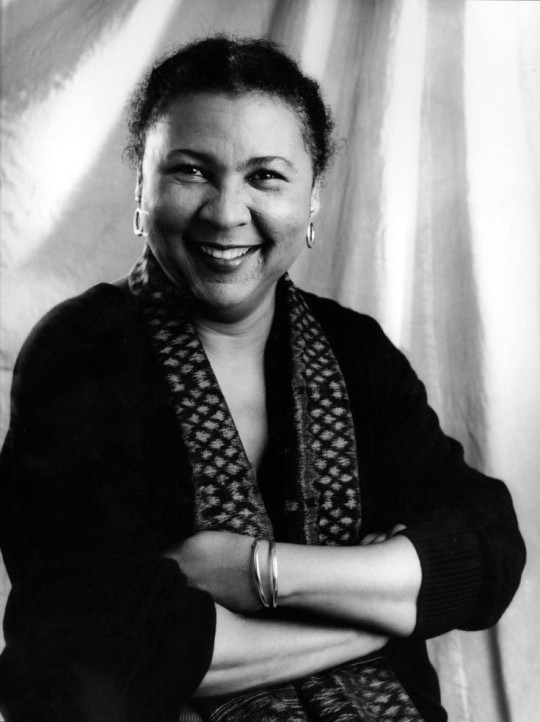
☆ Women race and class by Angela Davis. It contains Marxist feminist analysis of gender, race and class. The third book written by Davis, it covers U.S. history from the slave trade and abolitionism movements to the women's liberation movements which began in the 1960s.
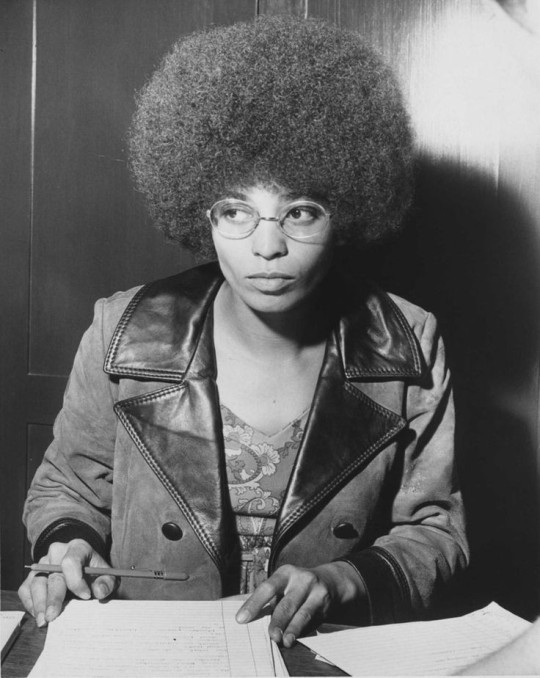
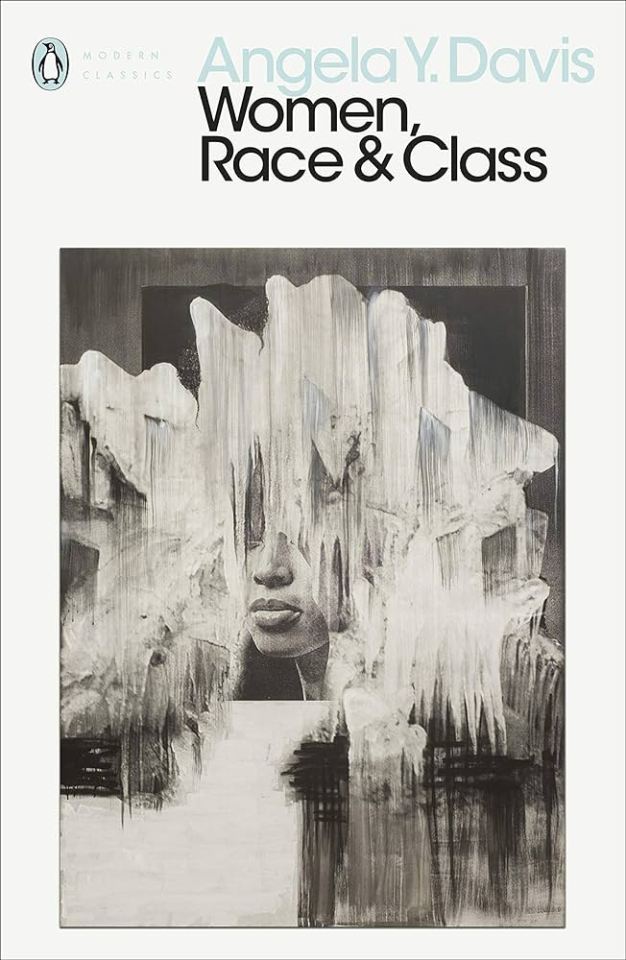
☆ One is not born a woman by Monique Wittig. In her essay One Is Not Born A Woman, Monique Wittig interrogates gender. The essay begins with “A materialist feminist approach to women’s oppression destroys the idea that women are a ‘natural group’: a racial group of a special kind, a group perceived as natural, a group of men considered as materially specific in their bodies.” Wittig tries to highlight the importance of questioning and deconstructing the concept and origin of womanhood using a material perspective. She argues that the idea and classification of women as a natural group is the base of the further oppression women deal with.
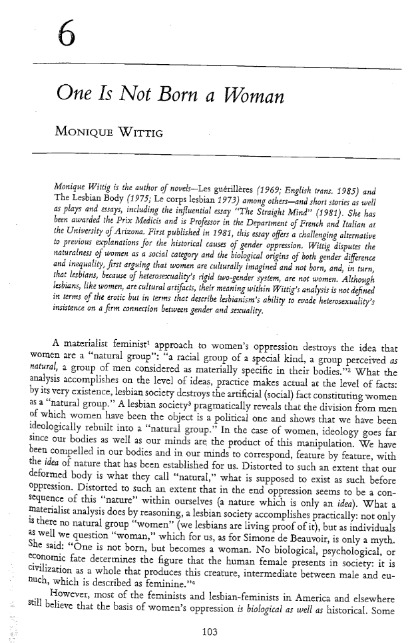
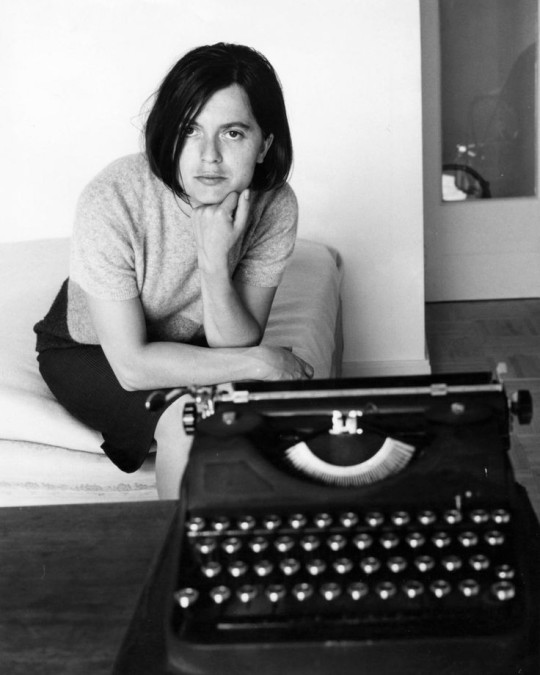
☆ The Second Sex (i skipped the first chapter bc biology...) by Simone Beauvoir. The Second Sex (French: Le Deuxième Sexe) is a 1949 book by the French existentialist philosopher Simone de Beauvoir, in which the author discusses the treatment of women in the present society as well as throughout all of history. Beauvoir researched and wrote the book in about 14 months between 1946 and 1949.
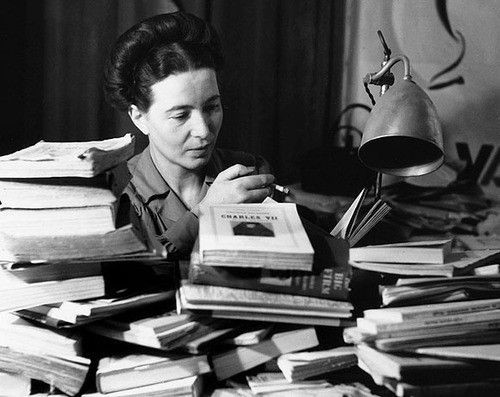
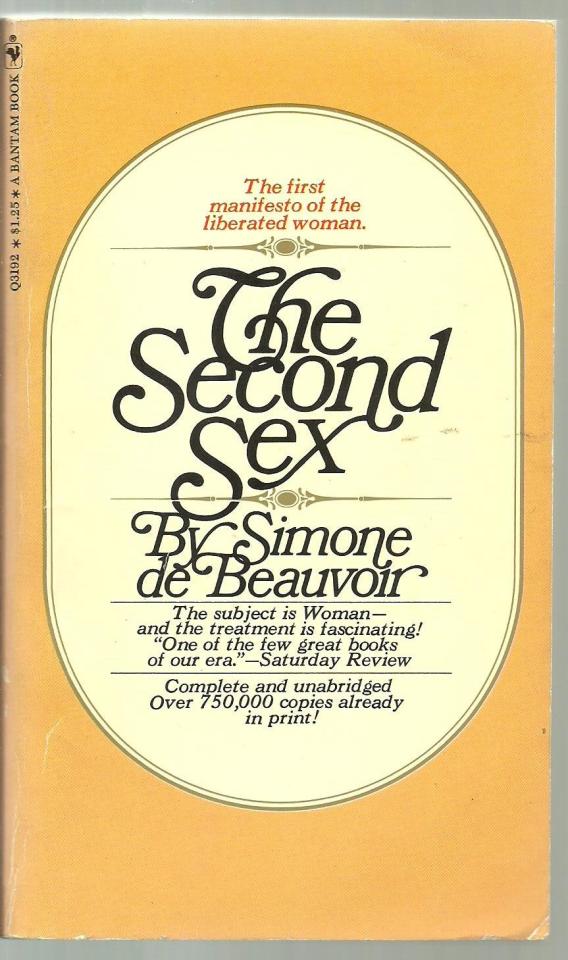
(you can fin all of these references on internet, give them a try !! )
#coquette#it girl#lana del rey#girlboss#jane birkin#girlblogging#vintage#lizzy grant#60s girl#lanadelrey#feminism#literature#bell hooks#essay#simone de beauvoir#angela davis#cool girl#reading#books#smart#fiona apple#sofia coppola#Sylvia Plath
44 notes
·
View notes
Text
who up getting existentialist on the dash with me tonight [WARNING: LONG!!]
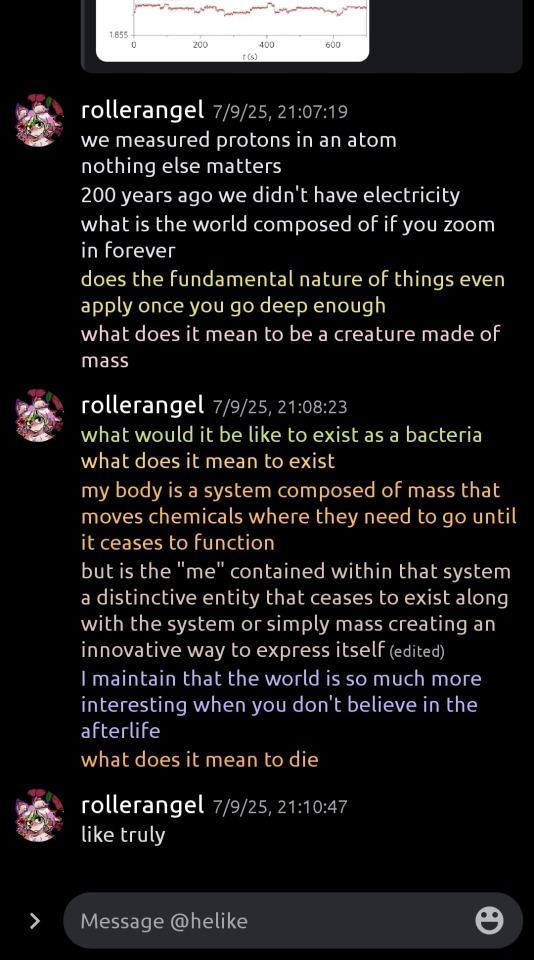


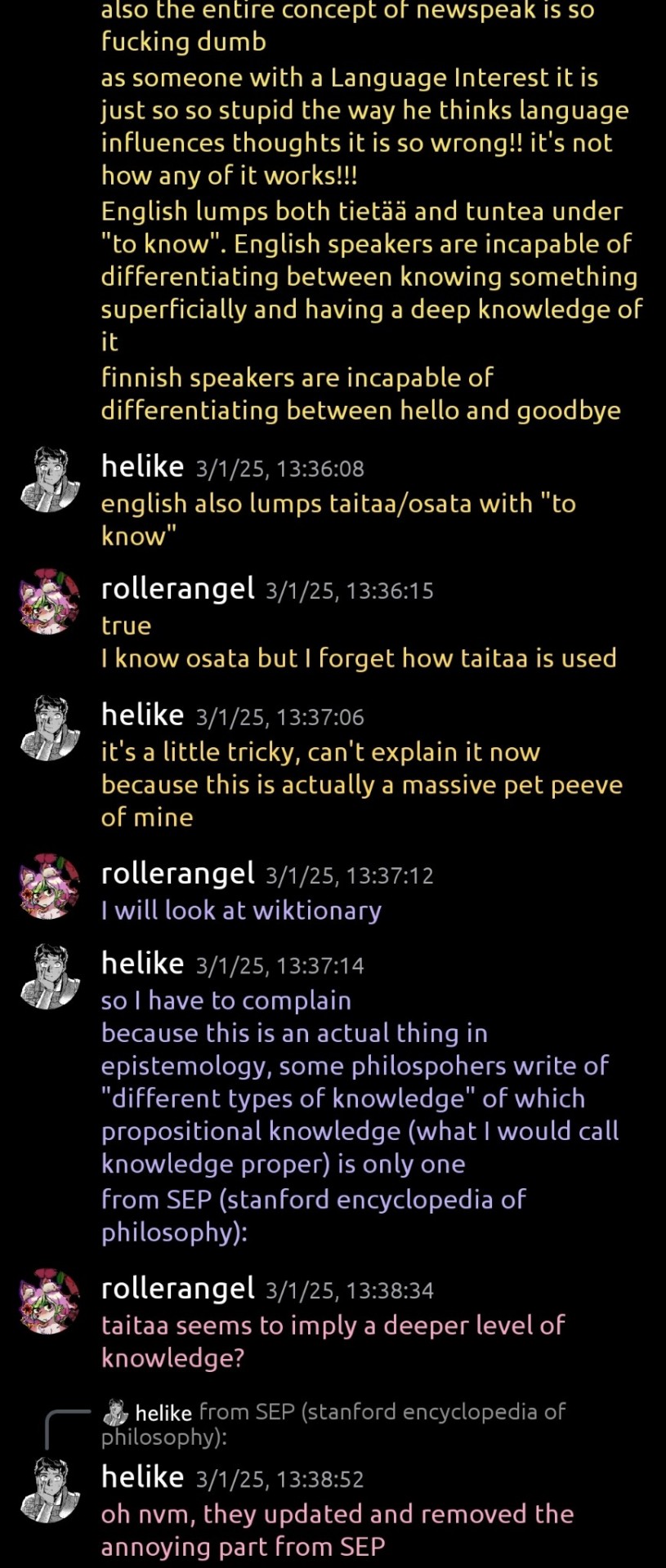


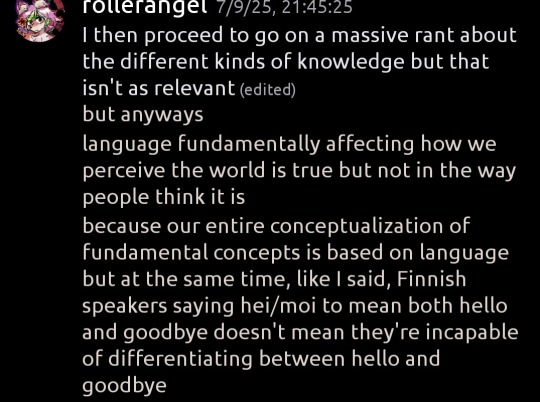
which I'm sure you know already obviously my point in bringing this up is that we are so steeped in cultural/anthropomorphic thinking is that existentialism and the fundamental nature of things etc etc is also just an inherently meaningless concept. we are fundamentally unable to pry our conceptualization of concepts into language, and, more broadly, anthropomorphic perception of the universe from the understanding of said universe. & the idea of "alive" or "dead" is based on our limited understanding as matter perceiving itself and the cessation of our systems for doing so and change in function of the substance of said system what is knowledge? English philosophers ask when Finnish has the definition for multiple types of knowledge that makes this a non question. what is life? what does it mean to die? asks a biomechanical system that has invented the concept of self perception. yet as it perceives itself, it fundamentally alters its own perception. does a computer die when it no longer works. what is a fish. what is knowledge? it depends on who you ask and what language they speak
the concept of "life" only makes sense if you're working within the framework of an advanced biochemical entity that can react to the world around it & sees this perception and participation in the world as the self or the fundamental substance of it as an entity if we had no ego it would be another transformation of states like consciousness into unconsciousness & as computers/healthcare become more and more complex the definiton of being alive will become more and more of a convoluted concept as we attempt to gesture towards the ineffable perception/reaction towards the world as the definition of existence while people get parts of their brain replaced after an accident. are they dead? their perception/reactions have been fundamentally altered as to be a cessation & transformation of the system. if you kill someone and in the process of doing so transform the matter that made up their body to create an identical clone with the same memories, personality, substance etc. as who you killed did they die? it's the same substance and the same ego, working the same as it ever did, with barely a cessation in function. if this is dying, then when every single cell in your body is replaced over time do you die a few times over the course of your life without feeling or noticing?
the concept of life is a fish you know it when you see it you are sure what it is and yet when you try to study it and define it it becomes exponentially harder to define the closer you think you are because the concept itself is based on how we perceive the world death is a life made construct mass is mass
I think once you truly start to think about being alive it becomes increasingly clear it is just gesturing to a concept that formed sometime around when life got complex enough to avoid dying and is ultimately impossible to separate from life-centric conceptualization of the universe do the cells that live in my body ceasing to exist means a part of me is killed it makes me feel better that it's all bullshit
iam very interested in what computers will think of death when they can perceive and function in the world the way we can
do they die every time they're turned off and on or when they break what constitutes a cessation and altercation of the system what makes up the ego of the computer that cannot interact with the world around it how do you make something perceive in a way where it can meaningfully die and once you do so how does a different form of existence/ego alter our conceptions of this life in the first place when is such a thing born
viruses aren't a form of life but bacteria are do you ever think about that and like life on a microscopal level cells die inside of us on a massive level constantly
we are always in the process of dying to be a multicellular organism is to be a death generating machine that kills the life within it in order to sustain itself is it to be said then that the universe itself is one massive form of neverending life. that even the implosion and explosion of the big crunch and bang cycle is just the decay and rebirth of a multicellular organism decayed fertilizing the food that then becomes the cells in another organism's body then to say that the cells dying within us is a form of death is simply a matter of perspective and relativistic notions and perceptions of death. the cells do not perceive themselves, so the machine is the one that calls itself alive, rather pompously if the world could perceive itself, then, would it treat us like the inner organs of life? but we are the cells perceiving ourselves, and thus death is relevant to the cells on a life of this scale which is quite fascinating in my opinion
imagine if your red blood cells had existential crisises
what would you even say to them?
[cut out abit of unrelated convo here]

idont have too much more to add honestly just like still I think people get too supernaturalist about the concept usually the cells and bacteria in a multicellular organism, like perhaps coral, gaining self awareness, does not make the coral itself self aware it is an inverse of the human model and curiously, most people would not see the universe imploding on itself as a form of death, as in everything around us being also a form of life containing life that has then died life is perception of things and the ability to create change based on this perception, then. but is a vegetable alive? one might argue their biomechanical system functions fundamentally altered but without cessation, which is interesting to think about as a form of undeath. the ego has been shattered but the shell supporting it remains. alive in the scientific sense, dead in the cultural one. its heart can still perceive it needs to beat, and it must necessarily perceive many things or it would cease. but for life that grows complex enough, returning to the simplicities of less evolved biomechanical life is a form of death, you've ceased and changed state in a relativistically more meaningful sense than sleeping. because to the organism that can perceive existence/itself, the loss of this perception is the loss of the self. therefore, life has two definitions: a biomechanical machine that uses energy to change the world around it/itself through mechanical processes (such as pumping blood), and perpetual perception & reaction of the world around us, our own individualized idea of how to react to stimuli, the ego the idea of life as a specific definable meaningful concept & not a "fish" breaks down once you apply an understanding that is not based on fulfilling the biomechanical's machine's programming to avoid cessation of the self this being overrode only by overwhelming unpleasant perceptions of the world that negates its base nature
because in like
in the process of life defining and evolving an ego in order to more successfully reproduce as part of the natural selection some organisms went through, we became able to perceive ourselves and avoid death (not that every organism that experiences pain comprehends death, but that it experiences pain in situations that lead to death as a base drive). this evolutionary pressure to avoid death meant that the organism must both perceive itself as an extant entity, there must be an ego to experience suffering, & that this ego must perceive the world and act to avoid the unpleasant stimuli and thus, the ability to perceive & react to stimuli with an innate drive to react to prevent unpleasantness, like pain, & thus preserve the biomechanical machine, /is the beginning of life as we mean it in the cultural sense/, it's why vegetarians eat plants, it's why we don't think about the bacteria we kill when we flick a lighter. the ability to perceive unpleasant stimuli is the basis of life the cultural definition of life is to suffer. to be alive in the way a dog and not a plant is to be able to experience pain! the perception of the world around you is an evolutionary beneficiary mechanism to create an ego that can experience suffering & respond to the suffering to avoid the perceived threat of system cessation! to live is to suffer!
nothing remotely polished just a rant I had in oomf's dms. tell me ur thoughts (or not)
3 notes
·
View notes
Note
I loved your headcanon of Ratio being a gundam fan. What other media franchises would you think he would geek over and give a 3 hour lecture on why he thinks they're the greatest? (Aventurine and the cats would be his audience) I can definitely see him liking the NieR series with how philosophical they are.
Hello Anon! I'm glad you liked it, I really should watch more Gundam...
He would totally also geek out over the time mechanics in Legacy of Kain series and resonate with the existentialist themes of defeating determinism and being able to control one's own fate. I see him as a Kantian Deontologist though (someone who believes all good actions derive from good intentions in order to be good) so he would be horrified at the actions of the characters and the events that spun from this in the first place, but he'd still appreciate it and talk about it a lot.
I also know he and Aventurine would have a long, long talk about the events of SOMA (very very good game). It's a neat little game that extensively covers what it means to have a "soul" and presents a lot of questions about consciousness, the importance of memories in identity, quality of life, hope after the end etc etc and is an endless trove of thought exercises about stuff he might be pondering on (part of me feels like Ratio is debating between himself to put both him and Aventurine in the divergent universe as a little wish fulfillment for Aventurine to have better outcome in life in some way and for them to meet in another life)
Figure he'd also love Evangelion if he loves Gundam and see a little of himself in Shinji. He'd understand that boy.
And yes, he would also really love Nier. Both Replicant and Automata would really resonate. Nier deals a lot with the crushing weight of meaninglessness of existence, the extent one should pursue one's desires, letting go of what was in order to make room for what could be etc etc. He'd like those things, I feel, very human and very resonant with his own struggle for meaningful pursuits.
(I feel like he'd also like metal gear ngl, but I'm not too well-versed in that, though from what little I've seen it seems a him thing for me hmm he'd like explorations of existentialism mostly)
Imagine both him and Aventurine going through these series/games together in their free time! I like headcanoning that Aventurine struggles with a lot of questions about freedom, and Ratio carefully answers his concerns about them. I write about this a lot in my fics, poor Aven and his struggles, but I like to think by spending time with Ratio like this he begins to get more and more equipped in how to deal with his circumstance.
The cats would also be with them through all these (they'd get mama veri and papaturine to go play horror games with them)
#asks#voidmancer headcanons#aventio#dr ratio hsr#hsr dr ratio#aventurine hsr#hsr aventurine#aventurine x dr ratio
15 notes
·
View notes